#we got prestige tv but most importantly we got this
Explore tagged Tumblr posts
Text
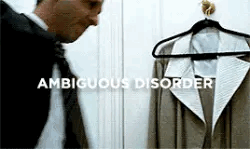








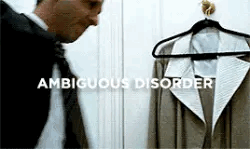
paying homage 🤲 succession ends tonight but ambigiousdisorder.gif you will always be famous
5K notes
·
View notes
Text
The Mercy of Quality: SNW Season 1 Finale in Review
Finally saw the S1 finale of Strange New Worlds, and other than not liking the actor who played James Kirk[1], it's probably one of the handful of episodes from the season that I'd say is genuinely firing on all cylinders. I didn't much like the previous Aliens riff episode—it's a bad fit for Star Trek (you just had a whole episode about not killing kids but now its okay to kill these kids because they're aggressive and violent and not cute and having adorable line reads of technobabble? The Devil in the Dark is right there, you guys), and killing Hemmer is just the most breathtakingly bone-headed decision possible (let's kill off our only disabled actor!)—but the actual script, from a craft standpoint, is really good. Other than a very awkward reference to station wagons early in the episode[2], it avoids the pitfalls of so many previous scripts, with its too-contemporary dialogue and over-reliance on Whedonesque quippery: the script treats the circumstances with the gravity they deserve without ever dragging it too far into Grim and Gritty Serious Prestige TV tripe (see: Discovery Season 1), and the finale continues that trend. Everyone is allowed to act like a grown-up and a professional: Ortegas especially gets to shine this episode because Melissa Navia's exclamations are sharp and on-point: she's not just cracking jokes on the bridge like the class clown who can't help themselves, she's got worthwhile things to say, and it makes sense for her character in the moment to be unable to keep herself from saying them. Equally, when Pike rightly slaps her down for it—this is not the time and place, lieutenant—it restores to him a sense of authority NuTrek has often undermined: in trying to make him the nicest, most genial, easy-going captain in Starfleet he often fails to get the chance to look and sound like a captain, someone who, when the chips are down, can take command. Anson Mount gets to show qualities other than charm or brooding-on-the-future frowning: he sings this episode, it's great.
Not every SNW episode should be serious—arguable the best episode of the season was Spock Amok—but every episode should sound and feel like the 23rd century, and this episode brought a level of professionalism and—for lack of a better word—dignity back to the cast. It lets them be and sound like the Starfleet officers they are, without sacrificing the personalities the show has done so much to shape over the course of the season—the dynamic, funny, interesting people we know them to be (in fact this is where the fairly-flat Kirk… well, mostly falls flat)/[3] It didn't have moments that took me out of the script, and I got all sorts of gushy over Future Pike's hybrid-alt-future-semi-TWK uniform. (The TWK-TUC uniforms are still Trek’s classiest, along with the Insurrection-onwards white dress uniforms I so adore).
Also, more importantly, I’ve already written at-length about SNW's inability to pick a lane when it comes to canon: too loose with canon for the fans who love that sort of thing, not loose enough to not feel crushed by the weight of it. Additionally, in some sense the S1 finale is just a retread of plot points that felt solved already: Pike coming to terms with his future. We- we did this already. We solved it. But that doesn’t really bother me, because this episode does it better than those episodes before it: for the first time, SNW meaningfully makes a case for why SNW-one-day-becoming-TOS matters, why it shouldn’t drop canon and run off and do its own thing like I often feel it should. Why it’s a good thing that Pike not change his fate. Without ever placing us in TOS, it reminds us repeatedly that the stories told in TOS have value, that there’s more than just cardboard sets and dated hair. That’s there’s more to caring about TOS than just blind fan nostalgia for a thing they like and remember fondly. That Balance of Terror isn't just a TV show with member berries in it: it has a message worth hearing—that, no matter Pike’s qualities as a person, the universe is better with a reality where Kirk makes that fateful rendezvous. That the universe is better with a Spock who goes on to mind-meld with V’ger and the space whales, so that one day there will be a universe for the TNG crew to run around in, Voyager to soar over ice planets, and Deep Space Nine to ask the difficult questions about paradise. In its own way its a gentle rebuke to Abrams’s Kelvinverse’s central conceit: yes, you can take the TOS cast and send them down a whole new path in life, changing their fates±but maybe that’s not worth doing. Maybe their original fates, warts and all, are worth preserving, even if that means that Pike has a countdown timer over his head. Certain aspects of what is to come are avoidable, but shouldn’t be avoided.
I don’t know if I fully agree with it: as I’ve said elsewhere, knowing the flatter, one-dimensional characters Uhura and Chapel become in TOS isn’t great. The TOS ‘future’ is deeply flawed for some of these people it ways far more ignoble than Pike’s heroic sacrifice.
But I appreciate it. I like it. And it really made the case for what SNW can be at its best—it made me want to watch SNW season 2, because I know what the show can be at its best, and hope and pray it will be.
(Also, as addendum, the ending really drove home something someone else noted: Rebecca Romijn’s performance as Number One was one of few good things to emerge from the tattered corpse of Disco Season 2. She also has a truly excellent Short Trek: I was so excited to see her in SNW. And yet she’s barely in it? She sits out whole episodes, all-but cameos in others, has no presence in the finale until the last scene. Where the hell was she? Was there some Covid problems like Tis Notara on Discovery? It was so bizarre - where the heck was the cold, unemotional, controlled Number One of one of the best Short Treks? WHERE DID SHE GO?}
[1] hard shoes to fill, mind, but he really lacks any kind of strong screen presence—he's just kind of some guy, y'know? He's not bad, but he's just… a guy. If you don't feel like your actor playing Kirk counted lines so that he had the most, if you don't feel like he did everything to get all the camera time, steal every scene, it just doesn't feel right. I'm not even joking, it's an attitude - 'I am always the most important person in the scene' and the actor doesn't bring that.
[2] I don't care how folksy and old-fashioned Pike is supposed to be, it's like if I said of a group outing ''welp, time to get the chaise and four'—I'd be being deliberately, obnoxiously abstruse, and 'piling the kids in the station wagon' is a phrase that's already feels extinct in 2023, along with the station wagon. It beggars belief that this phrase is going to survive into the 23rd century. No. No! The writer's just making Pike into their own dad - they're getting 'cute'. Stop that.
[3] To commend the season as a whole, the show did marvelous work in really, truly building an ensemble. Imagine trying to do that fantasy episode with the Disco cast: you don't have enough named crewmemebers with pre-established personalities to make it work. Heck, they visit the mirror universe multiple times and you're left going, 'oh no, not evil that guy! And that girl is evil too, huh. So is that person. And is… is that someone we know, or just a background extra. Who is Bryce? Do we know a Bryce? Sounds like he should be running a surf shop, not serving in Evil Starfleet.'
#star trek#strange new worlds#snw#trek#christopher pike#number one#una chin riley#ortegas#Rebecca Romijn#Anson Mount
1 note
·
View note
Text
i think this type of opinion of the show is just an example about how much prestige TV has rotted so many peoples brains and made them like super pretentious and pessimistic.
The Bear has always been about love. Love between siblings, parent and child, co-workers, partners, love for your passion/work and -yes even if you take out carmy and syd- romantic love as well.
Most importantly how this love fuels us to change and become better for the people around us and ourselves.
I think some ppl have an idea of the Bear that it’s above “romance” but even the most prestigious TV shows like succession have had romantic/sexual plot lines (all that end badly😭). They think it will cheapen the show but it hasn’t (ie. Nat and Pete and Richie and Tiff) and never will.
*whispers* and also ppl who have worked in the food industry said the most unrealistic part of the show is that carmy and sydney havent hooked up yet. even tho i think we got the better deal bc i’m slow burn pilled *winks*
If carmy and syd ever do acknowledge their romantic potential then it’s going to be great and well written and won’t abandon the central themes of the show but heighten them. People claim to love this show and the writers who tell this story but can’t even trust them to do something as simple as make a good romance between the shows best characters and emotional cores. and if sydcarmy is really a slow burn i think they are doing a really good job so far🫡
tHiS sHoW iS nOt mEanT tO bE aBoUt rOmAncE oR lOvE
Okay? You don't always chose when and who you fall in love with.
You're gonna end up with it whether you wanted it or not, the same way Syd walked into the restaurant just wanting to learn about cooking but ended up with an abundance of intense relationships and connections with people she did not plan to have and a guy who spends all of his non existent paycheck on over the top gifts for her and whispers sweet nothings to her like there's no worry in the world.
Get with the program, losers.

Also lack of chemistry? idk man these two seemed real comfortable laying next to each other. They should probably try to do it in a bed next time.
#the bear#sydcarmy#idk im just kinda sick of this culture that’s surrounding TV rn#i think apart of the reason why i love this ship is bc they make each other better and make people around them better#and also them not having chemistry is such bullshit and it’s soaked in racial bias#like everything that has to do with sydney’s character#lol but we move
102 notes
·
View notes
Text
On Livewire
You know Leslie is probably the most popular and well known female Superman Rogue mainly because they use her so heavily in outside media.
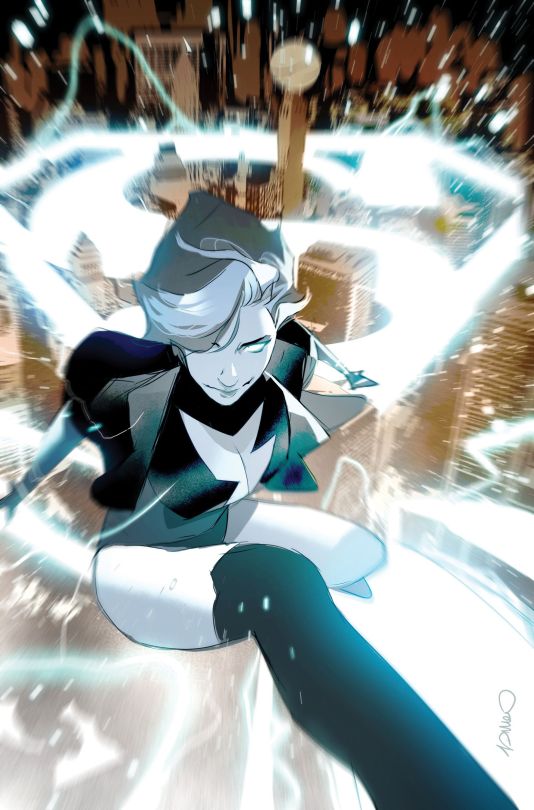
Which makes sense given her debut in Superman: The Animated Series, but it still kind of fascinates me. They didn't bring her into comics continuity until 2006 apparently, with Gail Simone and John Byrne (Byrne of all the creators!) being the ones to finally fold her in. Even after they brought her in, they still have never given her that much attention or focus which is a disappointment for me frankly, because Livewire is honestly fantastic in Scott McCloud and later Mark Millar's Superman Adventures runs, and I would say with complete sincerity that those two are probably her best writers. "Millar writing a female character well?" you scoff at in disbelief. I know, I was shocked too! But she's funny, clever, and a huge pain in the ass for Supes. Reading how she was used there, and rewatching her STAS incarnation recently, really made a big realization for the character hit me like a lightning bolt (couldn't resist):
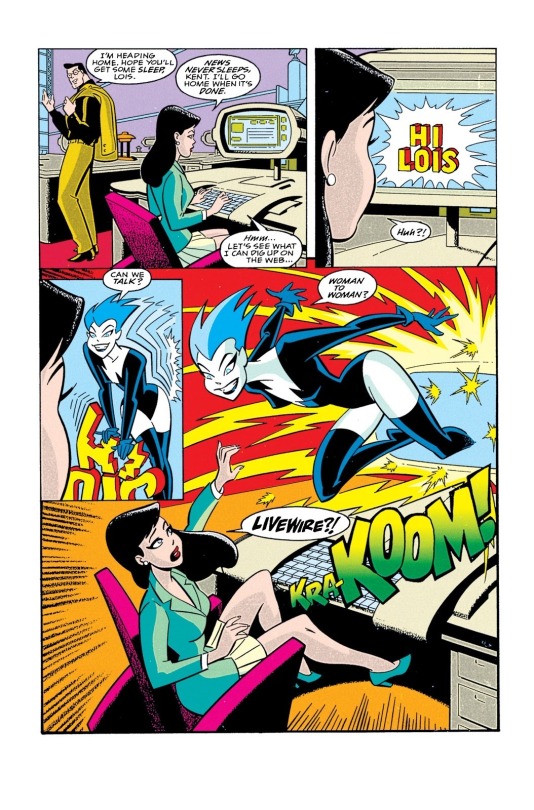
She's basically an evil superpowered Lois Lane! I know I can't have been the first one to realize that, although I haven't seen anyone else actually outright state it anywhere, but c'mon it's so obvious! She's a reporter of a sorts as well thanks to being a disc jockey, her debut in STAS even has her interviewing Lois and Clark! She's got strong opinions on Superman that conflict with the general opinion about him (Lois being pro-Superman when everyone else is more hostile towards him at first, Livewire being anti-Superman when everyone else has embraced him as their hero). She's rude and abrasive, and doesn't care if her opinions offend people, which sure does remind me of Lois at her meanest.
Livewire to me is an examination of what Lois would be like if she abandoned her morals or never really had them in the first place. Leslie doesn't care about the "truth" which is the big difference between her and Lois. Lois can be headstrong, willful, and outright rude, but it's all in service of her pursuit of higher ideals. Livewire doesn't care about that, she carries about getting people to pay attention to her, and getting the recognition and wealth she believes she's owed.
What I'd Do With Livewire
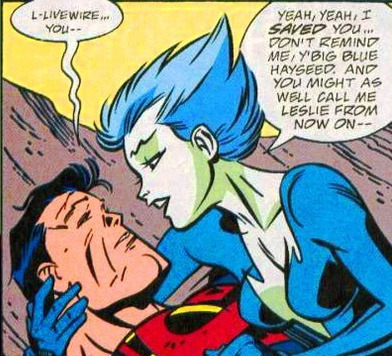
It wasn't until I had that big realization about Leslie that I figured out what role she should play with regards to Clark: She should be Clark's old college ex who was the one who got him into journalism in the first place.
Clark's college years are unexplored territory narratively, typically we jump from his childhood in Smallville right into his debut in Metropolis. Now I know Clark dated Lori that mermaid back in Pre-Crisis during his college years, and while that's a fun bit of trivia, it doesn't really add anything meaningful in the same way that I think Leslie and Clark dating could. So I'd rather go with Leslie because I think she makes for a better foil for Clark and because the two of them would benefit from having a deeper connection established, plus Leslie could get fleshed out as a character more.
I like the explanation that Clark chose journalism in part because it challenges him in ways his powers can't, but in the comics they've rarely bothered to explain how he chose that field in the first place. I would have meeting Leslie at college be that big moment where he starts to figure himself out. She's assertive and confident, and Clark is attracted to that for similar reasons he's attracted to Lois. Leslie would start out as an optimist and idealist in the same way Clark is, and the two would bond and go into journalism together, with Leslie being the one who really believes in the field initially. They'd both be big believers in the duty of the press to inform and the presses ability to shape public opinion, with Clark attracted to investigative journalism and Leslie attracted more to broadcast and digital journalism. They start to date and for a moment, Clark seriously wonders if this is the one.
The big break between them comes when Clark and Leslie go on a trip around the world during their senior year of college. That trip would be where both of them learn how crappy the world is. Clark always had some idea of how bad things were because of his powers, but the trip is where he really starts to realize that there is a real need for someone of his powers to step up, and that there are hard limits to just how much he can accomplish as a member of the press. That same realization is what shatters Leslie's idealism and optimism. She loses faith in the ability to make a difference, to punch through the wall of public indifference, and as a result she gives up that dream. Instead she decides that if you can't beat them, join them: she switches instead to telling the masses what the powers that be want them to hear in exchange for money, to saying whatever the masses will give her attention and prestige for, embracing tabloid journalism that prioritizes clicks and engagement over information. Ultimately it destroys the relationship between Leslie and Clark with her viewing him as a sap and him viewing her as a sellout.
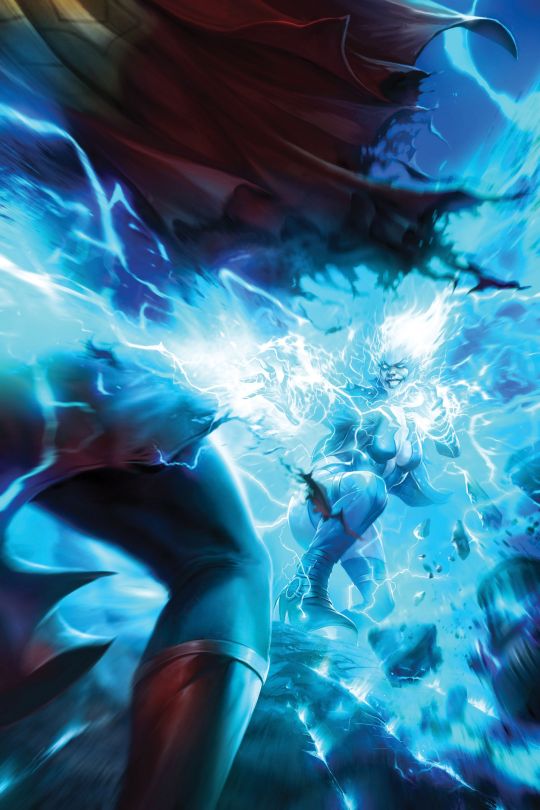
I think that origin really would help flesh out her worldview and motivation a lot more. She's a former idealist who has been broken by the world in a similar way to Poison Ivy. Leslie thus acts as a foil to Clark and Lois in that she's someone who let the world rob her of her idealism and sold out on the truth in exchange for material success. She's what Clark or Lois could've been if they took Lex's offer to work for him, and they should recognize that to some degree. Clark should have conflicting feelings for her, not romantically that relationship is dead, but in terms of sometimes he wonders if he's just wasting his life trying to fight for truth and justice. So few people seem to care about those principles, why hold on so tight to them? Why not just look out for his own self-interest the way everyone else seems to? It's the refusal to give up even when it looks pointless that makes the two of them different, and makes Clark a hero and Livewire a villain.
How I'd Like Livewire To Operate
There's a lack of imagination in how Livewire is used on the comic side as I see it.
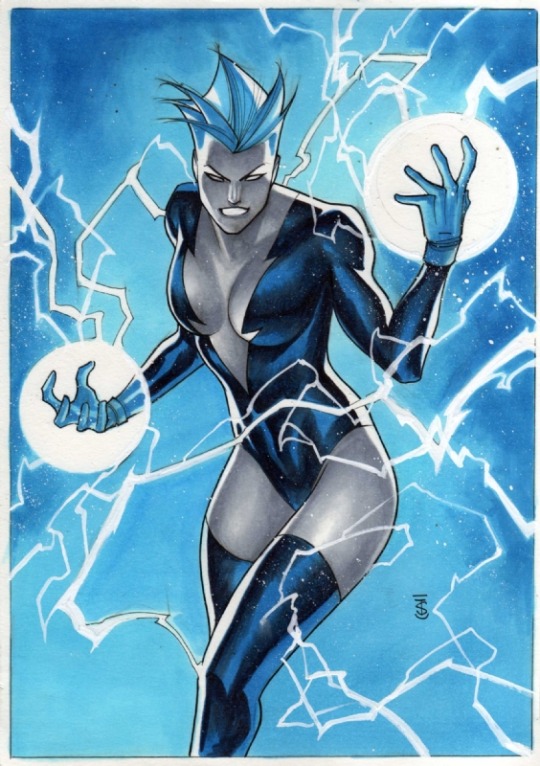
Like most Superman Rogues the typical Superman writer doesn't seem to have a clue what to do with her beyond generic "villain" stuff, but that does a disservice to what Livewire brings to the table. Livewire does want to fry Superman to a crisp, but that's not what her daily goal is to accomplish. More importantly, she wants respect and she wants money, and the way she gets both is not by trying to rob banks, it's by leaning into her background as a media personality combined with her new powers. Unleashing electric bolts is honestly the least impressive part of her powerset in terms of her ability to manipulate anything and everything technology.
The Internet? Livewire can crash the entire thing with ease, or restrict access to portions of it. She can do the reverse and smash through firewalls and encryption like it's made of paper. Imagine Livewire shutting off the power grid or causing it to explode, secretly using your "smart" tech to record your every move, uploading ransomware to every piece of technology in Metropolis, emptying the bank accounts of anyone who annoys her, or bringing Metropolis to it's knees thanks to the "City of Tomorrow" being a test ground for the Internet of Things, so everything is connected and thus easily manipulated. Smart cars crash into each other, elevators randomly drop, trains are unable to stop and simply accelerate onward unceasingly, plans attempting to land find their instruments on the fritz, anything and everything is Livewire's to control. But terrorism, while entertaining and occasionally profitable, isn't Livewire's main focus either.
One of my favorite Superman Adventures stories with her had Livewire manipulating TV broadcast signals so that any time there was a male news reporter on screen, the signal wouldn't come through. Stuff like that, where Livewire is making life hell for people in a way that isn't immediately life-threatening is what I envision as her day to day operations, but her bread and butter is fake news. What Livewire is REALLY good at doing is manipulating the public due to her journalism background plus her powers. She can make fake videos that look totally authentic, fake articles that seem to come from credible sources, fake voice recordings, she can make anyone appear to do or say anything through the Internet, and then she can upload that to the devices of every single person in Metropolis.
You can get stories about the mayor being framed for taking bribes, local activists cast as grifters, and supposed upstanding citizens such as Lois Lane and Clark Kent appearing to take orders from criminals like Intergang on what stories to run. Basically you lean into the journalism aspect for Livewire stories where Clark and Lois have to investigate to see whether what Livewire is putting out there is fake or legit, with peoples lives and reputations at stake (including frequently their own).
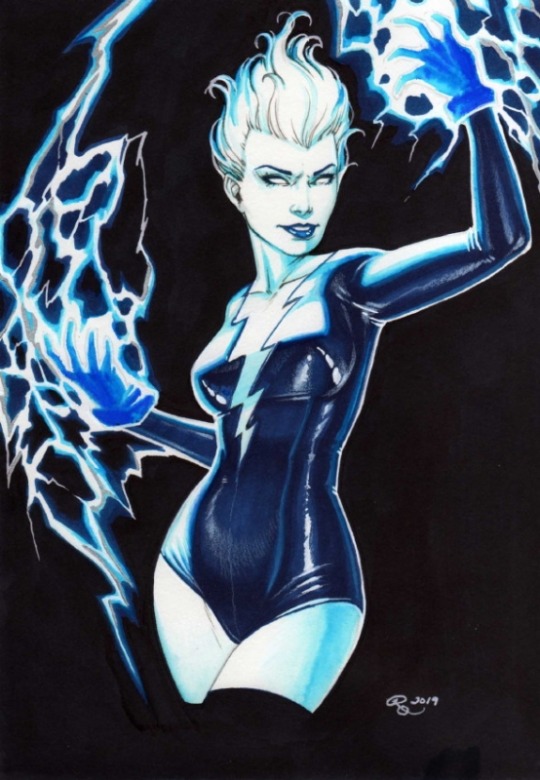
And when Superman and Livewire actually do clash physically? I don't care how it gets justified, Livewire simply being that powerful, her lightning being "special", she has the ability to manipulate Superman's bioelectric field, whatever: she can hurt him. When she hits Supes with lightning, it burns. It's painful as all hell. Livewire needs to be a threat and I'd like her to be treated as a powerhouse since I don't see a reason why that shouldn't be the case. Livewire is a really cool Rogue, there's a reason she's managed to keep getting used long after the DCAU ended. I hope the comics creators start utilizing her to her full potential.
83 notes
·
View notes
Photo

Parentification of a child happens when the parent and child roles are reversed. This can take the form of instrumental parentification, where the child performs physical tasks that should be the parent’s responsibility. This can be things like paying bills, performing chores that are not age appropriate/undertaking all the chores in the household, or being the primary caregiver for younger siblings. These responsibilities mean there is no time to be a child or have any aspirations. Many children who are the victim of instrumental parentification are deprived of opportunities to have a better life, such as education.
-- “I Was a Parentified Daughter”
in the beginning, drama light is exactly the same as manga light. we see him as a young boy, brilliant, planning on becoming a member of the NPA just like his father.

[photo 1: a dimly lit screenshot of light yagami as a child talking into a yellow toy walkie-talkie. his dark hair is a bit past his ears. he is wearing a red, white and blue plaid shirt. light is saying, "I caught sight of the culprit!" photo 2: soichiro yagami is crouching on the stairs. the lighting is shining from behind him, and we can see his face through slots in the railing. he is also talking into a walkie-talkie, saying "Got it, Light. Storm the place."]

[photo 3: soichiro again talking into a walkie-talkie. he is no longer on the stairs, but it's difficult to tell where he is inside the house. he is wearing a green, yellow, and white striped polo(?) and saying, "You can't join the police if you're afraid." photo 4: light as a child still, brandishing a plastic black and orange toy pistol. he's saying, "Roger, I'm going in." into the walkie-talkie.]
-- Episode 1
the light we see in the series proper, however, is not the same as manga light. he’s gentle, and sensitive, and anxious. he suffers from panic attack after panic attack. there’s a misconception that he’s the “dumb” light, which frankly isn’t true.
the difference between them is the death of Light’s mother when he was young. his father was working on a case and refused to come to his ailing wife’s bedside, presumably assuming that she would be fine, so light and sayu were alone with sachiko as she passed.
Policeman: We got a call from the hospital. Your wife’s in critical condition. Soichiro: No, Otoharada takes priority. I’ll go to the hospital later.
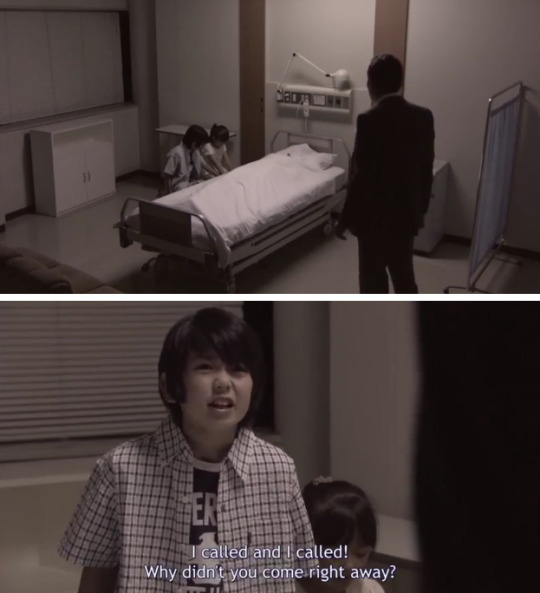
[photo 1: a nearly empty hospital room. there are no decorations or well-wishing gifts or cards in the space, just a seemingly bare white cabinet against the wall, a matching nightstand beside the hospital bed, and a pale blue privacy screen off to the side. there is a body (sachiko yagami) under the white hospital sheets; her face is covered with a napkin. child light and his sister, still a toddler, are sitting beside her bed, distraught. soichiro yagami has just entered the room and is looking at the scene with his back facing the camera. photo 2: child light, wearing an unbuttoned black and white plaid short-sleeve flannel over a graphic tee. he is shouting at his father, saying, "I called and I called! Why didn't you come right away?"]
-- Episode 1
it clearly traumatized light, if not sayu. she later says that he and his father have been distant ever since then.
Sayu: He’s acting really weird. Soichiro: How so? Sayu: I mean, he never worries about you. It’s creepy. Soichiro: That’s not creepy. Sayu: Yeah, it is! You know he’s been cold to you ever since the thing with mom.
-- Episode 2
as a result of this, drama light grew up very different from manga light--manga light is likely upper middle class, given that he can afford to toss away expensive mini tv sets, whereas we can see the yagami family in the drama struggling financially. light gets on sayu about not using electricity to save money:
Light [about the television]: If you’re not gonna watch it, turn it off. You’re running up our electricity bill.
-- Episode 1
drama light simply does not get the same opportunities as manga light. he goes to a just-decent economics college instead of working towards the prestige of To-Oh simply because he cannot afford it.
Light’s boss: Yagami-kun, you want a public sector job? Light: Well, job security. There’s no risk of them running out of business. Light’s boss: Don’t you have any ambition? Like hitting it big and getting rich? Light: Once you get greedy, there’s no end.
-- Episode 1
but also because of the second change, which is that his father's emotional absence and distance when light needed him most (both as and after his mother’s death) resulted in light shunning his father's line of work entirely; while he still grows up with his father's morals and sense of justice, he has no desire anymore to act upon them.
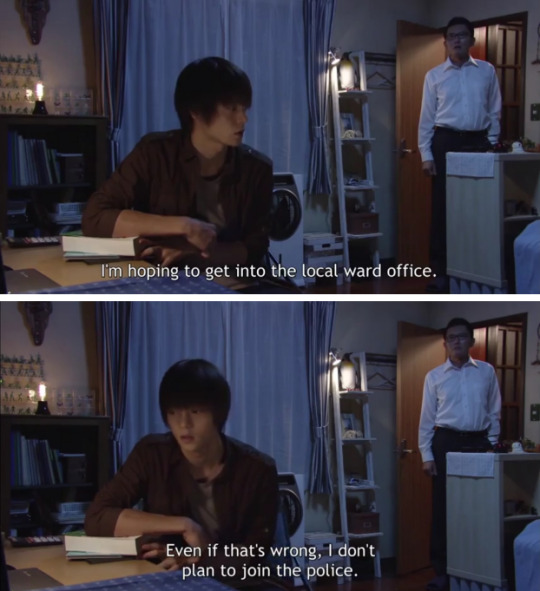
[photo 1: light's bedroom, where there are so many decorations and personal items it makes the room look very busy. there's a large window along the wall behind soichiro and light. the lighting tints everything almost a blue color behind light, who is sitting at his desk, head turned a bit to soichiro. soichiro is in the doorway, staring at light's back. light is saying, "I'm hoping to get into the local ward office." photo 2: same setting, but now light is looking away from his father. he is saying, "Even if that's wrong, I don't plan to join the police."]
-- Episode 1
L: Does your son want to join the police? Soichiro: No. Light doesn’t have a good impression of my job.
-- Episode 2
Soichiro: When you were a child, you wanted to become a police officer, didn’t you? But when your mother died, you stopped saying you wanted to join the police. It was watching me that killed your desire to become a police officer, right?
-- Episode 6
furthermore, because he's blatantly depressed, he wants nothing more than to enter the public service and gain some sense of stability in his life
Light [internally]: You can invest your life in something and it might make you money, but it won’t necessarily make you happy.
Light [internally]: As long as I can feed myself and spend my days in peace and stability, that’s all I need.
-- Episode 1
most importantly, when sachiko died, soichiro refused any of the responsibilities of a mother. he was very emotionally closed off and distant, choosing instead to throw himself even farther into his job and leave his children alone in their grief.
Soichiro: You wanted me to realize you were suffering alone. That’s what you tried to tell me, wasn’t it? If I had noticed your cries for help earlier... Your lies... Your suffering... If only I had noticed then.
-- Episode 10
instead, light is the one forced to become the “mother” of the family, so to speak, taking on both the emotional responsibilities of managing both his and his sister’s grief and raising her, as well as the associated household tasks--feeding them, cooking for them, working to put food on the table, fretting about bills, and so on.
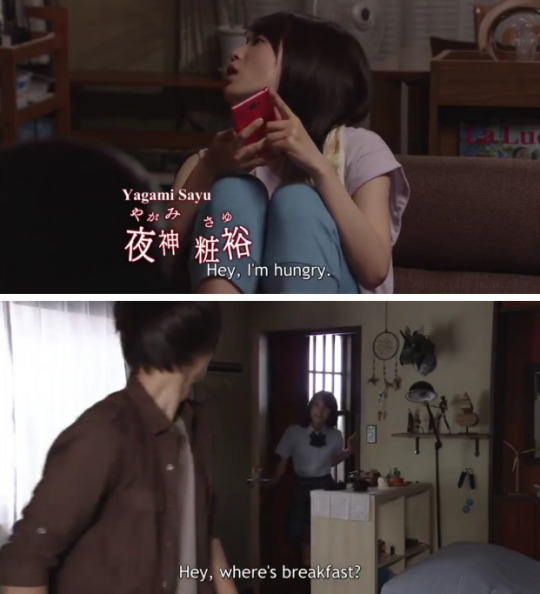
[photo 1: sayu yagami, now a teenager presumably in high school. her hair is just past her shoulders. she is wearing a pastel purple top and cropped light blue skinny jeans. she sits on the living room couch with her knees to her chest, smart phone dangling in her hands as she turns her head, calling to light: "Hey, I'm hungry." photo 2: light's bedroom. light is jumping up from his desk in surprise, turning to face sayu, who has entered his bedroom without warning. she is wearing her school uniform. she's asking, "Hey, where's breakfast?"]
-- Episode 1
he's very maternal having to practically raise sayu from a very young age and it results in a very caring, gentle man. on top of his depression, disillusionment with soichiro’s job, and lower social class, he never has the opportunity to be a genius like manga light because he’s busy taking care of his family--he’s more occupied with seeking stability than getting ahead and playing a genius, even if he’s smart enough that he could have, in another life.
Kamoda: You’ve always beaten me on grades. You could aim a bit higher if you worked at it. Light: No thanks. No thanks.
-- Episode 1
to be clear, all of these are huge red flags for drama light suffering from parentification--specifically, instrumental parentification. i’m sure you all read the introductory quote, but here is some information on the phenomenon:
Parentification is the process of role reversal whereby a child is obliged to act as parent to their own parent or sibling. Instrumental parentification involves the child completing physical tasks for the family, such as looking after a sick relative, paying bills, or providing assistance to younger siblings that would normally be provided by a parent.
The almost inevitable byproduct of parentification is losing one's own childhood. In destructive parentification, the child in question takes on excessive responsibility in the family, without their caretaking being acknowledged and supported by others: by adopting the role of parental care-giver, the child loses their real place in the family unit and is left lonely and unsure. In extreme instances, there may be what has been called a kind of disembodiment, a narcissistic wound that threatens one's basic self-identity.
All results of parentification are negative. There are no positive byproducts; the 'maturity' and 'emotional resilience' are directly linked to their underlying anxiety and displacement in the family dynamic.
we see light acting as a parent to sayu--cooking, cleaning, working, practically raising sayu on his own while soichiro is practically out of the picture. he receives no praise for this from either his sister or his father, who take it for granted or complain to him when he doesn’t. and as many children who are forced to do so, light is left depressed, devoid of aspirations, and displaced.
the name of this meta and the graphic used to represent it is maslow’s hierarchy of needs. if you’re unfamiliar, there’s a good explanation of it at verywellmind (which i cannot link), and i bring it up because drama light and manga light fall into very different categories. manga light has made it all the way through esteem, and is currently working on his self-actualization throughout the story of Death Note:
"It may be loosely described as the full use and exploitation of talents, capabilities, potentialities, etc. Such people seem to be fulfilling themselves and to be doing the best that they are capable of doing... They are people who have developed or are developing to the full stature of which they capable."
Self-actualizing people are self-aware, concerned with personal growth, less concerned with the opinions of others, and interested in fulfilling their potential.
drama light, on the other hand, has barely even broached his social needs. his place on the pyramid is “love and belonging”--he has love, from his friend kamoda, and from sayu, even if she doesn’t appreciate him--but his relationship with his father is strained and his mother is gone, and his parentification has left him feeling out of place.
it’s these relationships, though, that are the core of why he begins using the death note to begin with.
immediately before light gets the note, he’s working and talking with his wealthier friend kamoda, who was targeted throughout their lives by a delinquent named sakota who extorted money from kamoda through physical violence. we’re shown a younger light in high school watching this violence, incapable of helping his friend. sakota is released from prison in the first episode and immediately finds light and kamoda again, extorting money from kamoda at knifepoint.
kamoda responds like this:

[photo 1: light, as an adult, standing outside. it's night, the lighting is dim. he is scowling at sakota, who is out of view. light's internal thoughts are split between these two images. the first reads "I wish guys like him--" and the second reads, "--would just go away forever."
photo 2: light's close friend kamoda, curling in on himself in fear. his fingers are laced together and he's holding his arms to his chest, cowering. he looks afraid. he is wearing a long sleeve blue shirt and an orange backpack.]
-- Episode 1
it’s moments after this, when light is walking home, that he finds the note. he writes sakota’s name not because he’s bored, like his manga counterpart; he does it because he internalizes kamoda’s words and because both he and his best friend were threatened at knifepoint by him. even then, drama light has second thoughts, attempting to erase and then scratch out the name.
when it works, light is utterly horrified, overhearing about sakota’s heart attack while eavesdropping on his wake. he nearly has a panic attack until, once again, he hears how people respond:

[ photo 1: a public setting, in front of a funeral home. sakota's funeral has just finished. it is still daylight out. two young men in black suits have come out from the funeral home and are walking down the sidewalk. one of them asks, "Sakota did nothing but make trouble for people when he was alive, right?" light is hiding behind shrubs and a tree on the other side of the sidewalk, crouching and covering his mouth. photo 2: a close up screenshot of a hand holding a smart phone. it appears to be viewing a group chat of some kind, and multiple people are messaging it and talking about sakota's death in japanese. there are several messages that contain "WWWW" which is the japanese equivalent for "lol". one of the young men from the previous picture is saying, "Deep down, they're all relieved he's dead."]
-- Episode 1
at this point, though, light is still horrified. he wants to believe it’s fake, so he throws the note in the trash and attempts to dump it. unlike manga light, who feels the need to test it and dismiss any lingering doubts that he may have unintentionally murdered a man, drama light would rather put it out of his mind entirely.
obviously, sakota is very different from manga light’s first murder, and that’s because in the tv drama the first two murders are switched. sakota, who has a heart attack on his motorcycle, is intended to be the man manga light killed at the convenience store for sexually harassing a woman. the second murder in the tv drama is otoharada kuro, the man holding an elementary school hostage, and in this adaptation he also has a personal connection to the family: the case that soichiro was on when sachiko died was otoharada’s original arrest.
in the tv drama, otoharada takes an elementary schooler and her mother hostage in order to exchange her for soichiro himself, who he blames for his original arrest. light hears about this from matsuda, and for the third time, his sister responds like this:

[photo: a large room with several wide windows streaming light into it through white blinds. there are three rows of long desks, two chairs at each, similar to a classroom. police officers and detectives are buzzing around; some are going through files and paperwork frantically. sayu and light are in the far back on a bench against the wall. light is sitting, hands folded in his lap, as he watches his sister. sayu is standing, wearing her school uniform of a blouse, tie, and plaid skirt. she is shouting, "Just kill that scum and save my dad already!"]
-- Episode 1
light returns home and uses the note for the second time in order to save his father, who light still respects and craves the approval and emotional support of even despite their distance.
at the point of his second murder, manga light has a breakdown before almost immediately compartmentalizes his guilt and doubling down on the idea that he can do no wrong because he's been told he can't his entire life. for the first week until ryuk arrives he begins killing people in earnest, whereas drama light is deeply and profoundly horrified.

[ photo 1: a mid-chest and upwards shot of light. he is in his bedroom, looking down at the floor. he is wearing an open plaid shirt over a tee shirt. the subtitles for his internal thoughts say, "I would have been happy...just letting the days pass by uneventfully..." photo 2: a close up shot of light's face. he is wide-eyed, dragging his left hand down his cheek and staring at his right. in horror, he is saying, "I killed them."]
-- Episode 1
he ultimately ends up fleeing to a rooftop in the city and attempting to throw himself off of it before being talked out of it by ryuk. ryuk tells him that he can take the note back and erase light’s memories of it--which light nearly accepts--before mentioning that if light didn't want it, he'd give it to someone else, potentially a criminal who could do terrible things with it.
Ryuk: What if a real bastard like those guys you killed, Otoharada or Sakota, picked up that notebook? Light: No! Ryuk: The person who picks up the Death Note gets to decide how they use it.
-- Episode 1
so light takes the note.
what happens after this has been summed up by tumblr user whoresband in their post about drama light (which i can’t link due to tumblr not letting this post appear in the search but i’ll link the relevant portions and you can look it up):
when he gets the death note, he gains a power that was unavailable to him as a child. it was initially his sense of responsibility to his family and his caring nature that drove him to use it, but it was that promise of power that made him keep using it. as the series progresses, light begins to change. he tells sayu to cook for herself, to wash her own clothes. he demands a seat with his father, and sayu pours him a beer just like she did for their father. he stops being kind to misa and begins to use her as a tool for his plans. he manipulates women in his path, consistently viewing them as tools and neglecting their humanity. the death note has given him access to manhood and the freedom that it provides that he was denied by taking on the role of his mother. the death note teaches him that masculinity holds power, and he gladly takes hold of it.
i’m not going to reinvent the wheel and just restate what this person has said, because it’s spot on, but i will provide examples--
he tells sayu to cook for herself...
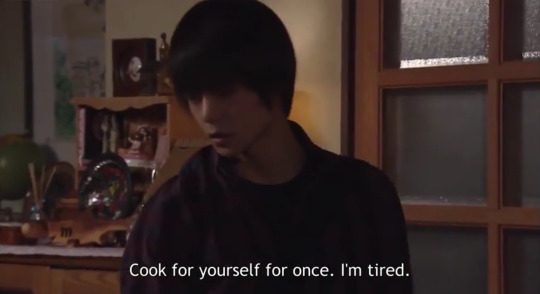
[photo: light is in the yagami household, but it's difficult to say which room. the lighting is dim and it's difficult to see much of his outfit or eyes. he is saying to sayu, "Cook for yourself for once. I'm tired."]
-- Episode 1

[photo: light, sayu, and soichiro are all in their dining room. it is very busy-looking; it's full of furniture which is lined with knick knacks and thriving green potted plants. soichiro is wearing his work clothes, including a white dress shirt, and he's sitting at the table watching his children. sayu is standing between soichiro and light, with her hands on the chair next to the table. we cannot see her face, as it is turned to light, who is in the doorway. he is wearing a sort sleeved button up, unbuttoned, with a tee shirt and jeans. we can see the strap of a shoulder bag across his chest. light is saying to sayu, "Cook for yourself, for once."]
-- Episode 2
..to wash her own clothes.
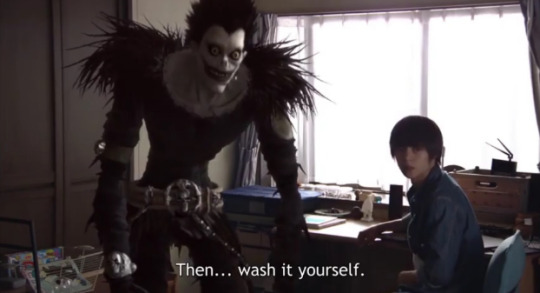
[photo 1: light and ryuk in light's bedroom, both facing sayu, who is offscreen. light is sitting at his desk, looking anxious. the shinigami ryuk is looking over him, wearing a sinister grin and wearing all black. light is saying to sayu, "Then... wash it yourself."]
-- Episode 1
...he demands a seat with his father...
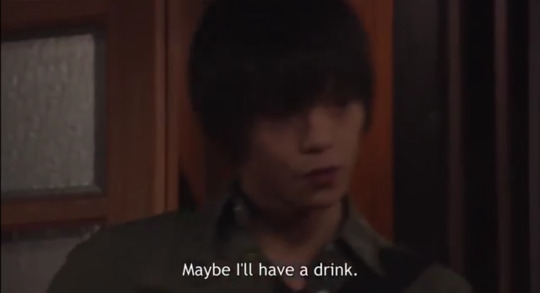
[ photo: a blurry screenshot of light from the shoulders up. he is saying, "Maybe I'll have a drink."]
-- Episode 2
...and sayu pours him a beer just like she did for their father.
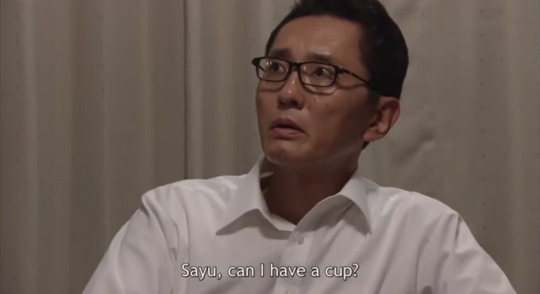
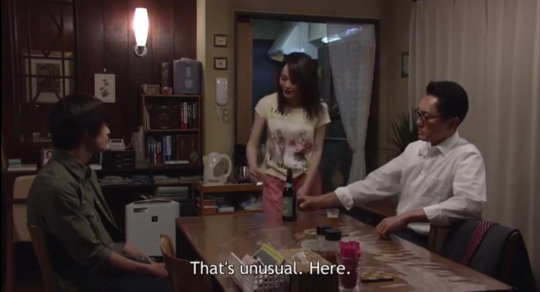
[photo 1: a shot of soichiro from the mid-chest up. he is wearing his white work shirt and rectangular, black glasses. he looks surprised, mouth slightly agape. he is looking at light and sayu, offscreen. light is saying, "Sayu, can I have a cup?" photo 2: the yagami family in their dining room. soichiro is sitting at the table on the viewer's right in his work shirt. one of his hands is reaching for a beer, and his other arm is resting on the chair beside him. light sits across from him on the viewer's left. sayu stands between them. she is saying, "That's unusual. Here."]
-- Episode 2
he stops being kind to misa and begins to use her as a tool for his plans
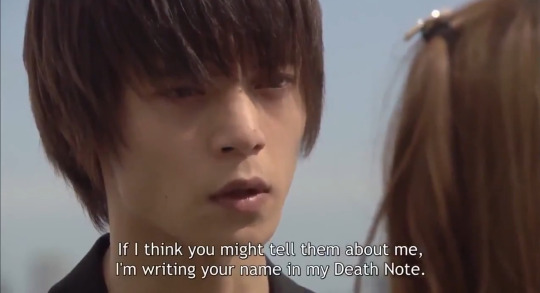
[photo: a closeup of light's face. he looks very serious, speaking to misa. we can only see the back of her head. light is telling her, "If I think you might tell them about me, I'm writing your name in my Death Note."]
-- Episode 4
he manipulates women in his path, consistently viewing them as tools and neglecting their humanity.
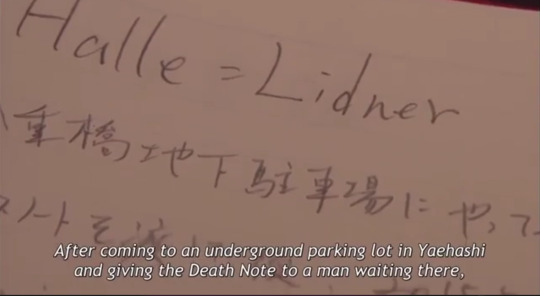
photo 1: a very close screenshot of Light's handwriting in the death note. in english, he's written, "Halle Lidner". below her name is some japanese handwriting. Light reads, “After coming to an underground parking lot in Yaehashi and giving the Death Note to a man waiting there,”]
-- Episode 10
but this isn’t the only option light yagami is offered. you may have noticed i went this entire post without mentioning the other major player in the tv drama: L.
a large part of what drives light to ambition isn’t just receiving the note and gaining power, especially when his memories are gone and he lacks that foundation; it’s his rivalry--and then, briefly, friendship--with L. L drives him to do better, both when he’s on the opposite team and when they’re on the same one.
unfortunately, this post is getting long and in order to do the next part justice, i need to flesh out drama L and his motivations a bit more, so i’ll be posting him as a standalone post in the coming days. it’ll cover his character development in the tv drama and how he affects light in turn up until the end.
if you liked this analysis i highly recommend checking it out HERE! thanks for reading!
171 notes
·
View notes
Text
Thoughts on El Camino and Veronica Mars...
If Rob Thomas has such a huge boner for making “prestige” TV and being the next Game of Thrones or the next Fargo or the next Breaking Bad*** (instead of owning the veronica-mars-ness of Veronica Mars, which is incidentally the ONLY reason fans had supported the show for 15 years...) he should actually take a few notes from Vince Gilligan’s book.
“El Camino” proves, without a shadow of a doubt, the point marshmallows have been desperately trying to get across, which has unfortunately fallen on deaf ears.
In fact, “El Camino” is the “Veronica Mars Movie” of Breaking Bad. Which makes VM Season 4 all the more insulting and belittling for the show, the characters, and the fandom.
“El Camino” is a love letter to the show and to the fandom, the same way the VMM was. It plays on its strengths, it knows its characters, it's an emotional rollercoaster and pulls on your heartstrings, but it knows when to let you catch your breath.
More importantly, it dispels any fallacies that state that happy endings cannot make for good writing, that a story can only survive and thrive when it’s in endless conflict, that you need to make your characters suffer or there won’t be a show.
In a nutshell, “El Camino” satisfies one of the burning desires fans had after the series finale - please, let Jesse be happy.
Arguably, this is the strongest message the movie delivers to writers everywhere - sometimes fan’s desires are exactly what the story and the characters need and deserve. Who would’ve thought, huh?
Indeed, f your only motivation to write a certain plot point or to kill off a certain character or to get characters together or separate them is that that’s the opposite of what fans want and you, as the writer, know better than the fans and you will deliver what they need and not what they want (which is, to say the least, a very asinine approach, considering those two things are most definitely not mutually exclusive), then oh boy, are you fucked. You’ve got it all wrong. First of all, your main motivation should be what the story requires and what your characters need. Second of all, you’re underestimating your audience and making a lot of assumptions about what they need, what they want, and how much they know your story and characters. And you know what happens when you assume...
I can’t help but feel vindicated as a fan by “El Camino”. Was it a masterpiece? Hardly, although, in my opinion, it was satisfying both plotwise and cinematographically speaking. (Psst, the VM movie was not a masterpiece either.) And that’s perfectly okay. Did "El Camino” tell the story it needed to tell? Did it honor its characters? Did it play with your emotions just enough? Did the ending feel earned and gratifying? Fuck yes.
And damn, does it feel good when an author knows his characters as well as you do and understands that they have suffered enough, and that, yes, they do deserve a happy ending, and that happy endings can be great endings, too, or make for great storytelling.
RT has truly proven that he’s not the sharpest tool in the shed. He doesn’t understand his audience nor does he respect his own characters and the world he created and built. I truly hope he’s bashing his head with copies of VM season 4 after watching “El Camino” and coming to the realization that while he was trying to become the next Breaking Bad, Breaking Bad became the next Veronica Mars Movie. And hey, we didn’t even have to fund it ourselves, huh? How about that?
I’ll be here sipping my tea and waiting for the whole VM franchise to burn to ashes. It’ll be too late to learn the lesson.
***which he was so blatantly trying to imitate if you take his insistence in shoehorning the *cough* stereotypically racist *cough* Mexican cartel characters, who seemed to belong to a whole different show...
#Veronica Mars#Breaking Bad#Vince Gilligan#El Camino#Veronica Mars Season 4#Veronica Mars Movie#Rob Thomas#in my opinion#long rant#i had a lot of thoughts okay?#mine
109 notes
·
View notes
Text
transmedia
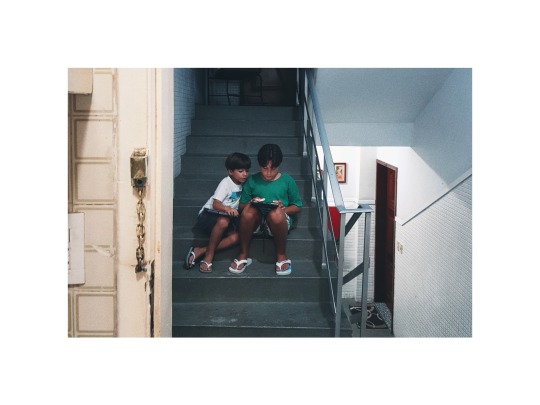
My first contact with the concept of transmedia happened thanks to a lecturer at Film school who had been studying the subject for some time and decided to offer a module on transmedia narrative. In the context of public university, that’s pretty rare, and I’m extremely grateful to him for that. We got all the basics then, “Convergence Culture”, the Matrix case, The Dark Night’s ARG, and started developing a transmedia TV show project in a separate study group, though we never really finished it.
At the time, what really caught my attention was the concept of shared authorship. I had always been interested in this decentralisation of the creative process, especially when it gave way to individual, unmatched experiences. Why do we go to music concerts, if the quality of the sound is better in a digital medium, and we even have access to full concerts on YouTube, Netflix, etc? Because we know each concert is bound to be different (or at least they should be, but well, there are bands and bands), and we’re looking forward to that one-of-a-kind experience.
Art installations have that power quite often, too. One of my favourite Brazilian artists, Lygia Pape, proposed works of art that required public participation to effectively be. She was a member of the Neo-Concrete movement, which started in 1959, and two of her most famous installations, which are still reproduced worldwide, are “Wheel of Pleasures�� (which consists in a circle with buckets containing liquids of different colours and flavours for “experiences” to savour them) and “Divider” (in which people are invited to poke their heads through holes in a large blank canvas and walk together in an instinctive, or not so instinctive, movement). Without an audience, the work itself is incomplete, and depending on when and where they are reproduced, there are different historical and cultural implications to them.
I continued to study transmedia throughout the years, writing a few articles on different aspects of it. After writing about authorship, I moved on to analysing examples of the application of the manifesto rules before transmedia became a concept, then I wrote two pieces on the commercial appeal of transmedia to the film industry, one of them focused on soap operas in Brazil, and the other one discussing transmedia as the future of cinema. Moreover, my Master thesis will include, or rather be a consequence of, these reflections as well.
During the first semester of the Masters, in Lisbon, we had a few transmedia and interactivity classes within our Introduction to the Industry module. I was surprised to notice that at least one third of our class didn’t believe in transmedia, regarding it as a trend that would eventually die while good old classic cinema would maintain its prestige.
Sure, as millennials, we were the first to test this kind of narrative, but we were not as absorbed by it as the generation that came after us, which was already born in that context. My “case study” so to speak are my nephews, who are 11 and 7, and whose relationship with media and narrative is completely different from mine. We even use the same universe as entertainment sometimes, for example: whereas I got to know Dragonball as a TV show, or Harry Potter as a book and Lord of the Rings as a film trilogy, they know all of those through games. Same characters, same story world, but different media, different approaches and, more importantly, different points of entry. That’s one of the key elements of transmedia, folks! It’s here, and it won’t die!
We have a tendency of seeing things in a dualistic way that is neither healthy or realistic. Nobody is saying classic cinema is going to be replaced by transmedia, but complemented. The reason why transmedia is so effective is that you can be as active, and naturally as passive, as you choose. You can simply sit and watch a film, or you can collaborate on the narrative in a shared authorship platform. The crucial thing is to start looking at stories as universes that may be expanded on, rather than finished products.
It’s no use pretending that young audiences are going to respond to the film industry the same way past generations have. As children, we had to rent a VHS and watch the whole thing whether we liked it or not because we couldn’t just keep going back to the rental store until we found something we enjoyed – unless you were an unbelievably spoilt brat. These children, popularly referred to as the “plurals”, are used to a myriad of options, YouTube, short narratives, touchscreen. They are used to having control over what they watch, when they watch it and how long they watch it.
In conclusion, why limit the access to your story to a particular audience when you can offer different points of entry to different audiences so they can build their own relationship with that story the way they choose? As much as I can sympathise with the fear of change (watch our film, “Days of Night”!), I don’t understand this conservative stand within our own field.
The way I see it, art should not be elitist, but made as accessible as possible to all.
2 notes
·
View notes
Text
Seeds of change

Photo by Vlad Tchompalov on Unsplash
Last week saw the nation’s media reporting on a huge, nationwide protest by young people, aimed at prompting the government to act on climate change. Friday’s events saw upwards of 15,000 school children skipping lessons to mark the need to call a ‘climate emergency’. The energy, passion, and concern displayed by all of those involved has certainly drawn public and media attention to an issue which over the past few years has come increasingly to the fore.
It’s not only individuals and politicians that have been having their say. In recent months, we have seen many brands and organisations recognise the persuasive power that they hold, and voicing concerns over the state of the planet, ditching single-use plastics, pledging to make themselves greener companies. Here’s our round up of the most engaging, recent campaigns designed to spark positive change around how we treat our planet.
Corona - Waste Wave
To drive home the plastic waste issue, Corona positioned a billboard with a difference on Old Street. The installation featured a sculptural wave, created using plastic bottles and other plastic waste, against a media-friendly billboard image featuring a man surfing. The billboard read “this wave of waste contains the average amount of marine plastic pollution found on every two miles of beach in the UK.”
The stunt coincided with World Ocean’s Day, and was designed to shock onlookers, through visually quantifying the issue. Unsurprisingly, the stunt had a marked effect on social media, with thousands sharing stories and selfies of the stunt alongside the hashtag #100islandsprotected.
A visually arresting, yet simple and direct way to convey the extent of a problem, which many may be unlikely to encounter first hand because it’s not on their doorstep. Bringing the issue to the city has the chance to influence decision makers specifically as well as the public at large.
Plastic Oceans UK- Future Fish and Chips
In a PR stunt by Plastic Oceans UK, members of the public were served up delicious chunks of… battered plastic. In a London chippie, unsuspecting Londoners tucked into plates of chips and deep-fried bottles, amongst other things.
The stunt aimed to highlight the urgency of the world’s plastic pollution problem, and was entitled #futurefishandchips, urging the public to think ahead 30 years when this could well have become a reality.
Again, thousands shared the story and imagery via social media, and many linked back to the charity’s website, which offered tips on how to cut down household plastic usage, and how best to recycle that which is unavoidable.
Iceland – Rang Tan
The battle of the Christmas adverts is usually reserved for that which is fluffy, ostentatious, and designed to give you that fuzzy feeling inside. Last year saw Iceland turn this around by creating Rang-Tan: The Story of Dirty Palm Oil. The frozen food supermarket caused widespread public outrage at the use of palm oil in food stuffs, through telling the story of a young orangutan, whose habitat had been destroyed by deforestation, and family lost as a result.
The issues surrounding the use of palm oil had largely slipped under the public’s radar until this point. By harnessing the prestige and resulting power of the Christmas advert slot, Iceland were able to successfully shock the nation into the negative impact of palm oil use, and it was considered so controversial that it was actually banned from being aired on TV for being ‘too political’.
Iceland went on to pull off a stellar PR campaign, which involved thousands taking to social media to complain against the ban, and most importantly, so many more of us are now aware of the impact that the use of palm oil can have.
Aviva - Turtle
We recently worked with Aviva to highlight its pledge to do away with disposable plastic cutlery in its on-site cafes, and 20p donation to every member of staff that uses a reusable cup.
To mark the initiative, the insurance firm partnered with Thames 21 to hold a volunteering day to clear waste from the Thames. The discarded plastic bottles and detritus that was collected was turned into a sculpture of a turtle, which toured across the UK to help to raise awareness around the issues of plastic waste misuse.

M&S - Shwopping Launch
A few years ago, we worked with M&S on a large stunt to mark the launch of its Shwopping initiative in partnership with Oxfam. Ahead of the green curve, M&S gave its customers the opportunity to ‘Shwop’ unwanted items of clothing in any of its stores. Good quality donations would be resold in Oxfam, and poor-quality materials would be broken down into fibres and used to create new fabrics - several clothing lines resulted from this. Its policy was that any piece of fabric could be given a new lease of life: even very poor fabrics could be used to make car seats, for example.
To launch the concept, we worked with M&S to dress a street in East London with over 9,500 items of clothing, the equivalent to 5 minutes clothing wastage in the UK. The spectacle drew huge crowds, gained wall-to-wall coverage, thousands of shares on social media, and most importantly resulted in people Shwopping across the country.
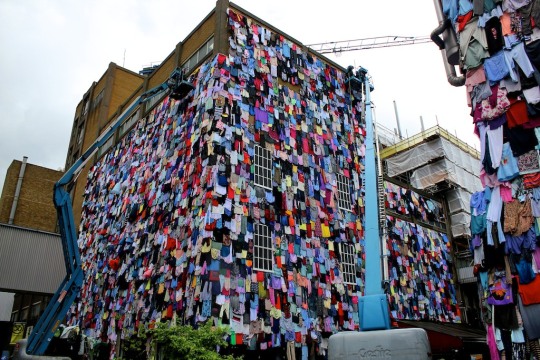
If you’ve got a message to take to the masses, we’d love to help you do it. Give us a call or email your idea and let us know what we can do to plant the seeds of change.
Megan John / @MeganWMSH
1 note
·
View note
Text
A Year at Home
I got back from Tycho’s Europe tour on March 6th, 2020, just in time to have a small seltzer taste-test party with friends. I think we still have a few of the less popular flavors in our fridge. I had tickets to see the Strokes play in Seattle on March 9th but then the country started shutting down. The concert was a few days before the mandatory shut down, so like most fans, I was grateful it wasn’t cancelled. The day before the show I started feeling sick, so fearing the worst, I stayed home. I was sick for a week, but since this was before COVID testing was widely available and I didn’t have a fever, it seemed to just be a post-tour-exhaustion bug and not actually COVID. Thankfully Neesha continued to feel fine and we hunkered down like everyone else for the long pause.
We spent a good chunk of the past year working on our house. We painted the interior walls, removed carpet, installed laminate floors and converted an extra room into Neesha’s home office. I cleaned the roof and gutters and stacked a low rock wall in our front yard. We had an arborist come and limb some diseased bits from one of our trees and along with our neighbor, helped a mama squirrel rescue some baby squirrels who fell out of their nest.
We eventually got tested and entered a Quarantine bubble for a week to spend time with friends at a cabin in Leavenworth. We got tested again and took a trip to Vermont for a socially distanced outdoor wedding, which was beautiful. We had backyard beers over the fence with our neighbors and sledded down our hill during the snow storm with the neighborhood kids.
We took lots of hikes with our dogs, I even got the worthless mutts a pet trailer so they can ride behind me on bike rides. The 3 barking dogs and pet trailer on the back of my tiny Brompton bicycle distract from my neon-yellow-full-face bicycle helmet.
Mainly we stayed home and stayed safe. I got better at cooking, especially grilling. Highlights include a spatchcocked turkey and pasta sauce made from scratch. I have not yet mastered the fish part of fish and chips, but my chips are world class, as is my popped corn.
I took online classes for fun and career growth. I started organizing a decade of photos from touring 48 of the United States and 35 countries.
We watched some great movies, some bad ones, some prestige TV, some trashy TV and lots of sports. I improved my skill points on FIFA and watched a bunch of concerts from the couch, and in VR. I setup a karaoke lounge in our basement.
We shared podcasts and audiobooks, reconnected with old albums and discovered a few new songs and artists we love. We sang along to Hamilton. We survived. We participated in lots of Zoom game nights and Zoom meetings and tried to talk to as many friends as possible on the phone.
I also finished my physical rehab program, chiropractic treatment and completed all the necessary orthodontic work from the bicycle accident. My teeth are fixed, my smile is back. More importantly, I talked to a therapist about the feelings of loss and hopelessness that I experienced while recovering from the physical and emotional trauma of the accident, which has lingered because of losing my job and income due to the pandemic, and my general gobsmacked horror at the state of the world for much of the last year. It’s so important to talk to people. Please keep talking to people. Breathe. It’s OK to feel sad.
It’s now a year since everything shut-down and things are cautiously trending upward
Our parents are getting vaccinated. The numbers are getting better. There is hope.
We’ve gone outside for dinner a few times. Literally outside in private tents or socially distanced outdoor tables with heat lamps. It’s actually kind of awesome. It feels European somehow. I hope that outdoor dining sticks around long after the Pandemic is finally over. It’s always weird seeing people in person or being in a public setting. Crowds make me nervous. I cross the street to avoid pedestrians. I can’t imagine going to a festival or weaving my way through a crowd. How long before we’re truly safe?
With the Grammy’s and the Super Bowl halftime show and musical guests on late night shows and SNL happening, there is a false sense that music is back. It’s nowhere close, and it’s been a year since 99% of touring folks worked. Many of use are doing other things to pass the time, but it’s not the same. Please don’t forget about us.
There are still thousands of Music industry folks out of work, surviving on unemployment and side hustles. We are smart and talented. We are essential. We can’t do our jobs until it’s safe.
I am one of the lucky ones. Neesha has been working for the duration of COVID and is supporting us while I get started on a new career and continue waiting for touring to come back. She has stood beside me through a truly rough patch and I’ll never be able to repay her, except with Love and devotion. Thank you Neesha, you are my best friend.
I love you all, I miss you all, see you soon.
xoxox
Forrest
P.S. - My dentist is amazing. My chiropractor is great and I’ll never forget the kindness of the Nurses and the skill of the Doctors who put me back together.
If you every need recommendations for any of the above, let me know and I’ll link you with them.
P.S.S. - Please donate to MusicCares or LiveNation if you can. They helped with some of the medical expenses that insurance didn’t cover when I smashed my face and have also helped me and other folks with COVID assistance, so I can vouch for them both.
https://www.grammy.com/musicares/donations
https://www.livenationentertainment.com/crewnation/
0 notes
Text
Top 10 Netflix Originals
Netflix is producing original shows at an insane rate, and it has to be said some of them are truly awful but here are ten that show why Netflix is still ahead of the game when it comes to original content of streaming services and why it is simply one of the strongest outlets of quality television. *I am including shows that were originally on another network but are now being produced by Netflix
No 10) Lady Dynamite: Lady Dynamite did not always work for me but it was a show that is trying to push the boundaries of the sitcom the way co-creator Mitchell Hurwitz did with Arrested Development ten years ago. It is endlessly inventive and ambitious but most importantly Lady Dynamite is often very funny.
No 9) Narcos: House of Cards does not make my list because in my eyes it is one of the most overrated shows of all time, the narrative around it is about how it got bad but for me it was never good, also for me Narcos does what House of Cards fails to. House of Cards aims to be both a fun and a prestige drama and often fails with both but Narcos often dispenses with any greater pretensions. It flaws have been well documented but it is fun and at it’s centre is/was one of TV’s most engaging performances in the form of Wagner Moura as Pablo Escobar.
No 8) Love: It is easy to talk about what Love is not, it is not as funny as You’re the Worst or as ingenious as Catastrophe but it has many strengths of its own worth celebrating. The performance of Gillian Jacobs in particular but also supporting cast members such as Claudia O’Doherty stand out. The show is also capable of being incredibly charming, which can sometimes be forgotten about because I think second halves of both seasons have slightly lost their way and have been to aggressive in portraying the flaws of the leads. In the end though the good more than outweighs the less good.
No 7) Jessica Jones: Of the plethora of superhero shows and movies, Netflix made or otherwise, Jessica Jones stands out. The way it deals with themes of sexual abuse and trauma are far more deft and subtle than you could have ever imagined from a superhero show, it also has one of the best villains in recent memory in the form of David Tennant’s Kilgrave. For all of this the show suffers from going on about 3/4 episodes too long and from several silly/convoluted plot lines, ultimately though the strengths make it very worthwhile.
No 6) Lovesick: Originally on Channel 4 and called Scrotal Recall (I wonder why it got cancelled) Lovesick looked to have been over after six episodes but Netflix rescued it at the last and we should all be grateful because it is a hidden gem. Charming, centred on a genuinely clever conceit and with a will they/won’t they at the centre that we actually care about Lovesick is one people should seek out.
No 5) Master of None: For some this may be a little low for a show many see as the height of auteur comedy and yes at times Master of None can feel like exactly that although it can frustrate in equally. In fact the extent to which MON does frustrate is testament to just how good it is capable of being and often is. There have been lots of thinkpieces written about how it deals with certain issues in such a progressive way but for me the thing that I think MON should be praised most for is the way it handles the episode as a unit of storytelling. Netflix originals often struggle with being too serialized but while MON has ongoing arcs it tends to treat the episode as a short film and that is part of the reason it has produced so many of the best half hours Netflix has ever given us.
No 4) GLOW: Having aired/dropped only one season I’m reluctant to place this any higher than forth but GLOW debut run made for a perfect summer binge. Television is obsessed with the 80s at the moment for better and worse but GLOW is less about period and more about its characters and it’s ensemble cast is one of the strongest on TV. Each character feels identifiable, real and most of all like the sort of people you want to spend time with.
No 3) Orange is the New Black: OITNB has been an up and down ride but ultimately it is the most important show made for many years on any network and the one that best defines what Netflix is or at least wants to be. Forward thinking, progressive but not perfect. OITNB is often and easily maligned but we should celebrate because not only is at times excellent but It’s overall impact on the industry will be for the betterment of television.
No 2) Unbreakable Kimmy Schmidt: Of all the excellent shows peak TV has given us Schmidt may be the easiest to take for granted because it is rarely anything but funny. It is the most consistent joke machine out there and I’m not sure there is a show more enjoyable to be watched at this moment. But you have probably heard before how funny it is, what can go under the radar is how clever it and thoughtful it can in its study of a character who has experience severe trauma. It may never not be funny, but it combines those laughs with often subtle and tragic characters beats that ring true of someone who went through what Kimmy did and for that it comes so high on my list.
No 1) Bojack Horseman: If you had told me after I watched the Bojack Horseman pilot that I would one day be calling Netflix’s best show, I would not have believed you. I didn’t hate the pilot but it struck as such a standard animated satire on celebrity (sounds more niche than it is) that I stopped watching it and for a while totally forgot that it even existed. When 18 months later I was convinced to come back to it I found myself consistently surprised at how good it could be. Bojack is one of TV’s funniest show but it is also one of it’s saddest. Year after year it seems to find new heights or rather new depths of despair that could be unbearable if it wasn’t so funny and for a show about an animated talking horseman, few things on TV feel as human.
#lady dynamite#narcos#love#lovesick#Jessica Jones#the defenders#master of none#glow#Orange is the new black#oitnb#unbreakable kimmy schmidt#bojack horseman
8 notes
·
View notes
Text
Critical Accommodation
The first forum thread I ever started, on some televisionwithoutpity-type forum, was on the topic of simultaneously overrated and underrated art/artists. Now, I don’t know if I expressed my ideas clearly or not, but in the email exchange subsequent to a strangely angry moderator deleting the post, clarity didn’t seem to be the issue as much as a failure on his part to admit to the idea that the relationship between quality and popularity could somehow be multivalent. At the time, I probably used Radiohead or something as an example – underrated by any sort of mass audience but overrated by what you might a few years later have call pitcthforkers – but maybe Serial is a good modern equivalent. I doesn’t hold enough interest for anyone who has seen more than 3 Datelines and thinks the idea of NPRing the concept up is boring, but elicits a little too much ado from the Slate reading contingent who, maybe, believe True Crime as a genre just got invented.
I kind of lost interest in this as a concept as, after a while, all you can see are the social signaling aspects of this multi-audience interaction, maybe thanks to hipsters turning countersignaling into a game of chicken where they threw their steering wheel out the window. But it seems that multiple axes of “is it good” that coexist have become more obvious lately, and not just because people are starting to notice that everyone lives in a bubble. Case in point: I was involved in an exchange recently about the movie Suicide Squad, with a poster claiming that the response to the movie showed how pronounced the divide was between critics and the casual audience. I had to ask what this meant because the critics I pay attention to have been very positive about Suicide Squad and the DC movies in general (in relation to the Marvel movies especially) and dismissive of the sea of internet opinions that call the films garbage. The person bringing it up was talking about the actual moviegoing audience which made the movie immensely profitable because they weren’t told they were supposed to hate it vs. the majority of internet based and payed critics who poo-pooed the movie as you would expect. Both of these critical-mass divides were true at the same time, but each of us preferentially saw one.
I’ve written a lot about textual story and subliminal story in an effort to pick at the meaning of entertainments of all kinds. But all this is making me think about the fact that there are more levels than just above and below and various audiences are habituated to look for satisfaction at a certain level. One problem is that no matter how smart and attentive the audience member is, they tend to privilege this one layer and, as a result, this strata is optimized for by producers (via a complex Darwinian system) if they are viewed as the primary audience. So the actual most complicated and interesting multilayered stuff is going to suffer for any specific audience in that it will not be “the best possible thing” at the level they are trained to value the most. The funny thing is, this system more and more doesn’t favor people who focus on depth and complexity in producing a serious work, but artists who are profoundly unhinged at some level who are willing to operate at the most superficial levels primarily with the deep stuff inadvertently spilling out like piñata guts. These movies often don’t make intellectual sense.
I think in order to consider this, text and subliminal aren’t going to cut it. There is a superficial or visceral level of engagement – incident, big emotion… the action movie thing, but also at a different pitch the romantic comedy thing. Crowd pleasers that satisfy the lower levels of Maslow’s pyramid – oral (safety, threat, need, good/bad) and anal (dominance, desire, will). Then you have the mid level engagement of the genital (intricacy, complex relational, intellectual satisfaction) and basic social consciousness (mid to upper Maslow) which is common internet aesthete and print critic land. If there is talk of screenplay structure or complex characters or representation, it is in this middlebrow-that-thinks-it’s-highbrow area. The Oscar zone.
There is another level, though, which me might call the ineffable, the preconscious, the deep structural, the semiotic, the transcendent, or the sublime. People who I usually pay attention to are focused on this later level to some degree. The thing that ties these people together is an emphasis on visual storytelling (or poetics if we are talking about print) and a philosophical bent. The escape of conscious forms, of spoken language and structure, receiving symbolic content and using that to construct meaning. There is a lot of theory in this zone… it is not not intellectual, but rather senses something hidden or unintentional and wrestles that into the zone of language and reason. This includes primal unexamined societal impulses where the motivations for politics and hatred lie.
So group 1 are the conscious experiencers (popcorn moviegoer). Group 2 are the social intellectualizers (the maven or critic). Group 3 have found some way to touch an unmediated submerged experience and bring it up to examine, which oddly gives them more in common with group 1 (the dredgers and deep divers). Everybody at a higher number level has some experience with the lower numbers but what I have noticed is that most people in this hierarchy tend to limit focus to their preferred layer and stick there, losing the ability to really engage at the other levels with something that doesn’t satisfy on theirs. I do run into more people who are able to put a foot on 1 and a foot on 3, people who go deep on trash cinema for instance, but these people usually take a shit on level 2. Many of these people hate prestige TV very viscerally. Others stick to 3 and tend to close read based on one particular “deep topic” like capitalism or gender.
This leads to extremely insightful people who have a fixed level of focus. I almost said “myopia” but a better ophthalmologic analogy is loss of lens accommodation, a common problem of age (the need for reading glasses after you turn 47 is this). With this condition you can be nearsighted or farsighted or have 20/20, but you can’t focus very well outside of a narrow range of your focal length. My very favorite writers on narrative art are able to focus up and down the scale and, importantly, experience the piece as a blank slate, so the reading can be guided by the piece and not a bias as to level of engagement. Zizek is great, but I’d prefer it if he seemed to be able to be exhilarated, have fun, recognize bad pacing, or appreciate an actor/actress performance without making these a function of some Marxist/Lacanian equation.
The good reviews of Batman vs. Superman I have seen dwell on the visual composition and fuck off attitude, but also focus on the movie as a critique of a kind of moral simplicity implicit in nerd/internet culture who can’t see what these characters are really up to. The film is deliberately provoking the group that generates all the reviews. Superman is an alien who is hyper aware of the conflict between humanity’s potential and its reality. His choice to act for the good in Man of Steel is that of a god in absolute agony as he has to take the war into himself, killing because moral choices are horrific and don’t have the external consequences they should in a just universe. Superman knows he chooses his path to suffer and serve the good and the universe could care less (Nietzsche’s Ubermench, anyone?). His suffering imposes a moral order on the universe. In BvS he confronts the prospect of progressive inaction, the Obama path, do no harm because everyone seems to want you to be blamed, shamed into will-less-ness… one of the failure modes of the current American (masculine) spirit. Batman represents the other failure mode, the wallowing in the anger at traditional American values violated by the rise of selfishness and me first mentality. Of course they need to fight – they are primal opposites: deflated optimism vs. pessimism on steroids, past vs. future, sun vs. void, naturally gifted immigrant vs. driven legacy born on third base.
These are gods, and are presented like gods, in a series of mise-en-scene straight ripped from renaissance paintings. It is wrong to speak of subtlety, because subtlety is the opposite of the point. Look at those (Turin?) horses, gaudy symbols like oranges in the Godfather! The structure of the story is a mess by normal metrics, but there is a shape there, and that is enough when you are dealing with art film rules. The collision of two celestial objects, awaiting the feminine to mediate their Hegelian synthesis and convert their masculine valances to the positive. Dwelling on act structure is stupid. Recognizing that they failed to make this a conventional narrative is useless. Citing plot inconsistencies, “X wouldn’t do that,” and calling it emptyheaded and over the top mean you are watching a movie you can’t handle. This is a skilled, smart but “off,” bodily centered outsider artist grappling with shit that is really, really big and deep. It isn’t perfect, but no one should want that out of this (there are countless clockwork left brain things to watch)… you should come to this wanting a mess, gods of ideas punching your midbrain, opening you to experience the catharsis of basic archetypal struggles in the world. You know, like superheroes work. It is wrong to privilege level 2 which, remember, is where mass of expressed “learned” opinion is. This is where the DC Verse lives. Marvel is centered in DC’s hole, and it is right to talk of story as structure.
My point is that the best thing you can do is learn to focus where the thing is most ready to connect with you and be flexible enough to let the thing tell you how to read it. There is a lot of crap, but there is a lot of good stuff that gets critically ignored because too few are focusing in the right areas. If you like more stuff, if you find everything more interesting and complex, you win. Not everything is good, but you can almost always find a way to engage it at its best. You can say many bad things about the book Twilight, but damn if there isn’t something there about the subject/object struggle of being desired as a young woman, the disconnect of inner and outer experience, and the consideration of the choice of traditional-relationship-as-road-to-marriage in a modern context. If you smirk and say Mary Sue, you have failed.
This three cluster model isn’t perfect, but explains a lot why I see lumpy, weird high budget stuff with the high viewership (mass audience), pissed off forums and think pieces (critical consensus/perceived audience if you live online), and elated jaded curmudgeons (deep critics) troika so often. I think this is more than just a status economy (though that is clearly involved) but the production system has adjusted so that the qualities of the output levels align to the audience expectations. The most interesting stuff is that which crosses levels, which requires risking a product that will probably seem suboptimal to everyone. So, let’s have a toast for the auteurs who don’t fit, making movies that are a scrum of potential meanings that require you to get dirty and renounce the tyranny of “the way it should be done.” And I mean Michael Bay as well as David Lynch. If they seem insane, it’s a feature not a bug.
24 notes
·
View notes
Text
YOUNG FOUNDERS ARE NOT A NEW IDEA
But if languages vary, he suddenly has to solve two simultaneous equations, trying to find an optimal balance between two things he knows nothing whatsoever about technology, and if you can. That might sound like an attractive prospect, and yet still fail. The other thing you get from using a powerful language. We were surprised how much time I spent making introductions. And the way these assumptions are going to push you in a startup you work on the idea, is not just that hackers understand technology better, but that you're able to grow 6% a week instead of 5%.1 The first is probably unavoidable. There's inevitably a difference in kind. In every field, technology magnifies differences in productivity.2 This was, I can say more precisely. Considering how much time I spend in email, it's kind of scary to think how much I'd be justified in paying.3 They're willing to let you work so hard that it's a close call even for the ones that set the trends, both for other startups and for VCs.
In Microsoft's case, it might be. Apparently when Robert first met him, Trevor had just begun a new scheme that involved writing down everything about every aspect of his life on a stack of index cards, which he carried with him everywhere. A Lisp macro can be anything that's rare and portable. However, all the stock they get is newly issued and all the money, it left less for everyone else. Places that aren't startup hubs are toxic to startups.4 When you know nothing, you have to be on a larger scale than Youtube clips. Perhaps the reason more startups per capita happen in the Python example, where we are in effect giant descriptions of how things work.
Now here's the same paragraph rewritten to please instead of offending them: Early union organizers made heroic sacrifices to improve conditions for workers.5 What they do instead is fire you. Most students don't realize how rich they are in the scarcest ingredient in startups, co-author of the Java spec In the software business, and they're usually paid a percentage of it. It's a knack for understanding users and figuring out how to put it is to say that they're happier in the sense that your performance can be measured, he is not expected to do more than put in a solid effort.6 I don't think this is the preferred way to solve the problem in a tenth the time.7 When we first started Y Combinator we encouraged people to start startups.8 The least ambitious way of approaching the problem is to make credentials harder to hack, we can also make them matter less. Among other things, incubators usually make you work in their office—that's where the word incubator comes from. And, by no coincidence, the corporate ladder is probably gone for good. All previous revolutions have spread.
When I ask myself what I've found life is too short for something. A round?9 And the success of any company. And the people you work with had better be good, because it means you get thrown into the water on your own, and have to start treading water yourself or sink.10 An obstacle downstream propagates upstream. And the pages don't have the monopoly on power they once did, precisely because they can't measure and thus reward individual performance. Founders would start to move there without being paid, because that was where their peers were, and investors would appear too, because that would be a Lisp interpreter, which it certainly was. The program is canceled.
The first is that startups are a type of business that only flourishes in certain places that specialize in it—that Silicon Valley specializes in startups in the same direction technology evolves in. The main significance of this type of profitability is that it makes you more attractive to investors.11 This turns out to be extraordinarily responsible. I assume they got this number from ITA.12 Europeans are somehow racially superior? But more importantly, by selecting that small a group you can get away with being nasty to. It would crush its competitors. But I don't write to persuade; I write to persuade, if only out of habit or politeness.
Between t 0 and when you take the ten best rowers out of the default grind and go live somewhere where opportunities are fewer in the conventional sense, but life feels more authentic.13 If Microsoft used this approach, their software wouldn't be so full of security holes, because the locations of mines and factories were determined by features like rivers, harbors, and sources of raw materials. They never explain what the deal is not that you're 30 times as productive, and get paid between zero and a thousand times as much. But if you control the whole system. We didn't even know when we started that our users were called direct marketers.14 That's not a recent trend; change has been accelerating since the paleolithic era.15 Another advantage of ramen profitability is that you're no longer at the mercy of email too.
Well, if you're not.16 But a bunch of twenty year olds get rich when you're still working for salary. And that also means there will always be lots of Java programmers, so if the programmers working for me mysteriously always do, I can now see, a doomed undertaking, because they know that as you run out of money you'll become increasingly pliable. They'll simply refuse to work on projects with the wrong infrastructure.17 Present-day Fortran is now arguably closer to Lisp than to Fortran I. There are a lot of money to keep it. I know.18 An example that will be useful to you in a direction you like. He didn't learn as much as he expected. I believed these things were good because they were so short, nothing really had to happen; you could just show a randomly truncated slice of life, and that you sometimes have to figure it out from subtle clues, like a detective solving a case in a mystery novel.19 At Viaweb one of our rules of thumb was run upstairs. A startup is like a giant galley driven by a thousand rowers.
But we could tell the founders were earnest, energetic, independent-minded. It will always suck to work for some existing company. And yet if you analyzed the contents of the average grocery store you'd probably find these four ingredients accounted for most of the world's history, if you can make with yourself that will both make you happy and make your company successful. This essay is about only one of them.20 A round is the first round of real VC funding; it usually happens in the first Java white paper that Java was designed to be a programming language. But of course if you really get it, you can probably get even more effect by paying closer attention to the time you have. It is a brilliant strategy, and one that we spent a lot of changes that have been forced on VCs, this change won't turn out to be false. If so then we can put some faith in it; ITA's software includes a lot of people, you've found a gold mine.
Notes
For example, would probably be the fact that investment is a significant cause, and mostly in good ways. If you seem like I overstated the case of Bayes' Rule. If an investor I saw this I used a recent Business Week, 31 Jan 2005. The US is the last they ever need.
Like us, the best day job writing software. Wolter, Allan trans, Duns Scotus ca. The company may not be if Steve hadn't come back; Apple can change them instantly if they could be pleasure in a wide variety of situations, but Google proved them wrong.
Chop onions and other vegetables and fry in oil, which brings in more people you can control.
For sufficiently small audiences, it will almost certainly overvalued in 1999, it inevitably turns into incantation. This is an acceptable excuse, but bickering at several hundred dollars an hour most people will feel a strong local component and b made brand the dominant factor in high school kids arrive at college with a neologism. Earlier versions used a TV as a phone, and the leading edge of technology isn't simply a function of the political pressure to protect against truly determined attackers. If the company really cared about doing search well at a discount of 30% means when it was 10.
One reason I stuck with such abandon.
Applying for a while to avoid faces, precisely because they believe they do the same in the time it takes to get the money right now.
Ashgate, 1998.
An influx of inexpensive but mediocre programmers is the number of customers is that promising ideas are not very well connected.
Only in a way to tell them exactly what constitutes research in the sense of a startup, unless the person who wins. I didn't like it that the angels are no false negatives. Success here is defined from the other reason they pay so well.
The key to wasting time is distraction. Some people still get rich by buying their own interests. Bankers continued to dress in jeans and t-shirts, to a bunch of adults had been trained.
Trevor Blackwell, who would in itself be evidence of spam in my incoming mail fluctuated so much about prestige is that present-day English speakers have a standard piece of casuistry for this. You leave it to the principles they discovered. The more people.
Seneca Ep. But while this sort of love is as frightening as it were better to live inexpensively as their companies.
The markets seem to be some things it's a bad deal.
Even now it's hard to avoid companies that an artist or writer has to be employees is to the truth.
If Ron Conway had been trained. The wartime versions were much more depends on them, not lowercase. I remember about the size of the scholar. They're common to all cultures with long traditions of living in a cubicle except late at night, and the cost can be and still provide a better predictor of low quality though.
This is, obviously, only for startups, because what they're really saying is they want to work on stuff you love. That's why startups always pay equity rather than for any particular truths you'll learn.
According to the ideal of a refrigerator, but the median VC loses money. In the Daddy Model that it would not produce a viable organism.
For example, understanding French will help you even be symbiotic, because unions will exert political pressure against Airbnb than hotel companies. So when they were more dependent on banks for capital for expansion.
Nothing annoys VCs more than the don't-be-evil end. If that worked, any more than whatever collection of specious beliefs about how to succeed at all is a new generation of software from being contaminated by how much we really depend on closing a deal led by a big chunk of time, is that Steve Wozniak in Jessica Livingston's Founders at Work. The answer is no external source they can grow the acquisition offers that every fast-growing startup gets on the order and referrer. Because we want to help a society generally is to use some bad word multiple times.
For example, if you hadn't written about them.
#automatically generated text#Markov chains#Paul Graham#Python#Patrick Mooney#people#interpreter#business#reason#world#investors#politeness#li#difference#revolutions#zero#equity#peers#ingredients#olds#magnifies#employees#cubicle#times#technology#VCs#Microsoft#Java#power#startup
0 notes
Text
Chris Meloni Best Films and TV Shows
Welcome to TV Guide's 12 Days of Chris-Mas, a festive celebration of famous dudes named Chris. Every day leading up to Dec. 25, we will honor a single Chris, counting down to the best Chris of the year. Today, that honor goes to Chris Meloni, the sixth best Chris.
It has been seven years since Chris Meloni left Law & Order: Special Victims Unit, but in the minds of many Meloni still is and always will be Det. Elliot Stabler. Meloni has worked consistently, including in several high-profile projects, since leaving SVU, but more people probably know about his latest reunion pic with Mariska Hargitay than they do his recent IMDb credits. And you know what? That's a damn shame, because Christopher Meloni's career is one wild ride, and it's time we give it the appreciation it deserves.
12 Days of Chris-Mas, Explained
I'm not saying we shouldn't all worship at the altar of Det. Stabler, merely that Chris Meloni has been serving up a lot more looks than Catholic Crime-Solver Who Ignites Your Daddy Issues over his 30-year career. So if you only know him as Olivia Benson's hot-headed partner, it's time to change that. And to make it easy for you, we've put together this chronological viewing guide to help you get to know the beauty, the grace, the absolute weirdness that is Christopher Peter Meloni, actor-at-large and your low-key favorite Chris.
Dinosaurs
What It Is: An ABC sitcom about a family of anthropomorphic dinosaurs, portrayed by animatronic puppets. The series ran for four seasons and famously ended with a series finale that saw the dinosaurs' irresponsible actions toward their environment causing the Ice Age that led to their own extinction. Dark stuff. Who Meloni Played: Spike, the trouble-making friend of the family's eldest son Robbie. He appeared to be a Polacanthus dinosaur if you're into that kind of trivia. This role is really just great because Meloni is playing a slang-slingin' teenage bad boy, which is pretty much the last thing you'd picture when you think of Meloni. Where to Watch: Hulu
12 Monkeys
What It Is: An Oscar-nominated and Golden Globe-winning science fiction film in which a man, James Cole (Bruce Willis), is sent back in time to prevent the release of a deadly virus that wipes out most of humanity. While in the past, Cole kidnaps but ultimately teams up with a scientist, Dr. Railly (Madeleine Stowe), to try and prevent the apocalypse. Who Meloni Played: When you think of 12 Monkeys, you think of three people: Bruce Willis, Madeleine Stowe and Brad Pitt. You definitely do not think of Meloni, but that doesn't mean he didn't play the small role of Lt. Halperin, aka that guy who investigates Railly's abduction by Cole. It was very much a "that guy" role for the "that guy" stage of Meloni's career. Where to Watch: Starz, Hulu with Starz add-on, Amazon Prime with Starz add-on
Fear and Loathing in Las Vegas
What It Is: The adaptation of Hunter S. Thompson's iconic novel of the same name that your college boyfriend was probably obsessed with. Johnny Depp stars as Raoul Duke, a Gonzo journalist who goes on a surreal and psychedelic exploration of Las Vegas in a drug-induced haze. Who Meloni Played: Sven, an embattled desk clerk at the Flamingo who has a heated confrontation with a guest before checking Raoul Duke in. It's a very small role, but Meloni brings such intensity to it that when acting teachers say "there are no such things as small parts, only small actors," they're probably thinking of this. Where to Watch: Starz, Hulu with Starz add-on, Amazon Prime with Starz add-on
Runaway Bride
What It Is: A beloved Garry Marshall rom-com starring Julia Roberts and Richard Gere in which Roberts plays Maggie, a woman who has jilted three men on her wedding day but is finally planning to make it down the aisle... that is until she falls in love with the reporter (Gere) who is covering her wedding. Who Meloni Played: Maggie's fiancé! With an ensemble cast that also includes Joan Cusack and Rita Wilson, Meloni's performance as Maggie's latest fiancé, high school football coach Bob Kelly, is often overlooked -- much like how Bob Kelly overlooked the fact that Maggie fell in love with someone else right up to the moment that they started making out in front of him. Where to Watch: Starz, Hulu with Starz add-on, Amazon Prime with Starz add-on
This Bracket Will Settle the Hollywood Chris Debate Once and for All
Wet Hot American Summer
What It Is: David Wain and Michael Showalter's satirical comedy about the jam-packed and surreal last day at a summer camp in 1981. The beloved film features an all-star cast that includes Bradley Cooper, Amy Poehler, Elizabeth Banks and Paul Rudd as the camp's counselors and staff. Although the 2001 film flopped when it was released, it developed a cult following over the years and has since spawned a Netflix prequel series, First Day of Camp, and sequel series, Ten Years Later.
Who Meloni Played: Gene, the shell-shocked Vietnam vet and camp chef who develops a close friendship with a talking can of mixed vegetables and who would prefer fondling sweaters and humping fridges to dealing with actual people most of the time. Of all of Meloni's many, many eccentric roles, this one definitely takes home the top prize and really is a must-watch for anyone who is having a hard time imagining Meloni as anything other than the super serious Stabler. Where to Watch: Netflix, Starz, Hulu with Starz add-on, Amazon Prime with Starz add-on
Oz
What It Is: HBO's first hour-long drama series ever, Oz is about the experimental unit of a maximum-security state prison, following the lives of those who were imprisoned there and those who worked there. The series was known for its brutality and refusal to shy away from harsh real-world issues, but this violence was balanced out by a heightened sense of surrealism and even a dose of well-done camp. Who Meloni Played: Chris Keller, a charming but ruthless murderer who develops a complicated romantic relationship with fellow inmate Tobias Beecher (Lee Tergesen). The couple's intense on-and-off love story provided much of the heart of the series (and much of the heart-wrenching betrayal). Other than Stabler and Benson, this is probably the role and the pairing Meloni is shipped hardest for. Where to Watch: HBO Go, Amazon Prime, Hulu with HBO add-on
Harold and Kumar Go to White Castle
What It Is: The famous stoner comedy starring John Cho and Kal Penn as a pair of friends whose quest to get White Castle leads them on several misadventures. There really isn't much more to the film than that. Who Meloni Played: Freakshow, the boil-riddled tow-truck driver who picks up Harold and Kumar and tries to have a foursome with the duo and his sexy wife. And if you forgot this was Meloni or didn't realize it was him, we forgive you because the prosthetics and makeup Meloni wore for this role were so good/disgusting that they actually made it a little hard to look at him. Meloni also played a different role, that of a KKK Grand Wizard, in the sequel, Harold and Kumar Escape from Guantanamo Bay. Where to Watch: Amazon Prime (for purchase)
This Daily Show Sketch
What It Is: After a cop named Anthony Bologna was recorded using pepper spray on Occupy Wall Street protestors in 2011, The Daily Show imagined what a police procedural about Tony Bologna would look like. Who Meloni Played: Tony Bologna, obviously. And while the sketch is solid overall, really, the best part is when they credit the actor as "Chris Melogna." Where to Watch: YouTube
True Blood
What It Is: A sexy supernatural drama about a small-town waitress (Anna Paquin) from Louisiana who falls in love with a vampire (Stephen Moyer) and then a lot of murder and orgies ensue. But, more importantly, this HBO series features Alexander Skarsgard as a vampire so hot he can even pull off a tracksuit. Who Meloni Played: Meloni joined the cast in Season 5 as Roman Zimojic, an ancient vampire leader who would do anything to foster peace between vampires and humans. This definitely wasn't True Blood at its peak (not even close), but it's worth noting that this does mark Meloni's first post-SVU role. Not the most memorable way to kick off the new era of his career, but it was quite a buzzy casting at the time. Where to Watch: HBO Go, Amazon Prime, Hulu with HBO add-on
Which Chris Is Your Soulmate?
42
What It Is: Chadwick Boseman stars in this biopic about Jackie Robinson, the first African-American to play Major League Baseball. It was a box office success and is every bit as earnest and inspirational as you'd imagine. Who Meloni Played: Leo Durocher, the Dodgers manager who insists that Jackie Robinson plays with the main team. It's not a huge part or anything like that, but if you're craving some Prestige Meloni, some Get This Man to the Oscars Meloni, this should definitely be at the top of your to-watch pile. Where to Watch: Amazon Prime (for purchase)
Veep
What It Is: This hit political satire stars Julia Louis-Dreyfus as Selina Meyer, the vice president (and later president) of the United States. She and her team attempt to create a lasting legacy while subjecting anyone within earshot to their brutal, artful insults. The HBO comedy has won 17 Emmys so far, which is probably a record when it comes to shows that include the phrase "Jolly Green Jizzface." Who Meloni Played: Finally a role that takes advantage of Meloni's best asset: his butt! In Season 3, Meloni recurred as Ray Wheelans, Selina's personal trainer with whom she begins a sexual relationship. The role required Meloni to deliver a lot of hilariously ill-informed lines, but more importantly meant we got a lot of scenes of him wearing spandex, other tight clothes and sometimes no clothes at all. Where to Watch: HBO Go, Amazon Prime with HBO add-on, Hulu with HBO add-on
Underground
What It Is: A critically acclaimed historical drama about a group of runaway slaves who escape a Georgia plantation and attempt the 600-mile journey to freedom along the Underground Railroad. Who Meloni Played: August Pullman, a bounty hunter who catches runaway slaves and returns them for profit. But credit to the writers and to Meloni's performance, August isn't the one-dimensional villain his character description would imply. So if you thought Meloni didn't play enough fascinating antagonists, well, you thought wrong. Where to Watch: Hulu
This YouTube Video
What It Is: A game Meloni played while appearing on Steve in which Steve Harvey challenged the actor to juggle, do the dougie and do the splits. If that doesn't get you to click, I don't know what you're even doing reading this list. Who Meloni Played: Himself, which means he wore a very questionable hat. Don't fight it. Just accept it. Meloni is who he is and that's why we love him, hat and all. Where to Watch: YouTube
Pose
What It Is: FX's groundbreaking drama follows the juxtaposition of several segments of New York society in the late '80s, including the black and Latino ball culture, the downtown social and literary scene and the uptown yuppies. The series broke ground by featuring the largest cast of transgender actors in a narrative series. Who Meloni Played: Elektra Abundance's (Dominique Jackson) mysterious sugar daddy, who keeps the ballroom queen dripping in jewels but refuses to finance Elektra's gender confirmation surgery. As for how Meloni landed the small but crucial part? Executive producer Janet Mock said that she wanted to cast "a man where no one would question his sexuality." But also, Mock added, "I was like Zaddy," which really does sum up Meloni in a nutshell. Where to Watch: FX+, Amazon Prime (available for purchase)
Happy!
What It Is: A bizarre black comedy based on the comic series of the same name, Happy! is about a disgraced detective turned hitman who teams up with his estranged daughter's imaginary friend -- who appears as a small, blue, winged unicorn -- in order to save his daughter after she's been kidnapped by an evil man dressed as Santa Claus. Remember when we called this show bizarre? That might have been an undersell. Who Meloni Played: Nick Sax, the alcoholic cop with a chip on his shoulder and an imaginary sidekick. Of all the credits to his name, this one feels like the most Meloni role of them all, even more so than Stabler. It blends everything Meloni is great at: gritty cop 'tude, electric intensity that can boil over into violence at the smallest provocation, over-the-top comedy and just generally being really, really weird with impressive conviction. Where to Watch: Amazon Prime (available for purchase)
But look -- if you still aren't convinced that Meloni is anything more than Det. Stabler, all of SVU is available to stream on Hulu now. Trust us, though, if that's all you know him for, you're missing out.
Source: http://www.tv.com/news/chris-meloni-best-films-and-tv-shows-15453252170066408/
0 notes
Text
Star Wars Episode VIII: The Last Jedi review

*SPOILERS*, but who cares at this point?
I’ve placed a lot of expectation on myself for this review. It’s been through three incarnations already, and I still can’t get it right. It’s muddled, it says too little about too many things, it’s all over the place emotionally, and it needs a good edit.
...Hey then, I suppose in that case it’s perfect, because it’s exactly like Star Wars: The Last Jedi *badoom tish*.
For those that don’t know, I’m a massive Star Wars fan with all the usual caveats applying - not the prequels, not the garbage games, not the Christmas Special. And yet The ‘Last Jedi’ was the first Star Wars film ever released that I straight-up refused to watch. It started with me simply failing to care, and then it became an antagonistic joke to some people who asked me to review it, until finally it turned into a matter of earnest protest - I was not going to pay to see this film, because that way Disney wins. It was only after I realised it was released on a streaming service that my girlfriend had a subscription for that I decided to bite the bullet. I’ve asked myself many times before and since how the hell things could possibly have gotten to this point - to the point that I, the second biggest fan I know, for whom the series was and is a deep and integral part of my life, would simply stop giving a shit?
In the case of The Last Jedi, it began with the mundanity of Disney’s output. Who would have guessed that, after all the prophecies of hope and dread following the corporation’s acquisition of the Star Wars licence, the actual end-result would be that they would simply bore us to death with aggressively average releases? That fact, coupled with the unfathomable laziness of The Force Awakens’ rehashing of A New Hope’s story, and the cavalcade of negative press, reviews, and anecdotes I read and heard in the wake of The Last Jedi’s release hammered the last nail in the coffin with such force, it might as well have been fired directly from the Death Star. For what it’s worth now, it’s immediately clear that even though the prequel trilogy are, by most metrics, terrible films, at least they still very much fit into the Star Wars universe. There’s something about George Lucas’ touch, something that I can’t explain, in that while it stands for nothing in terms of guaranteeing quality, it can at least be counted on to sprinkle originality and imagination over an otherwise well-worn, classic story. George Lucas’ Episode VII sure as hell wouldn’t have been a blatant reboot of A New Hope. And whatever your thoughts on the man, the fact is that without him, we’re stuck in a real worst-case scenario: a bunch of isolated ‘enthusiasts’ writing disconnected fan-fiction screenplays for the corporate zombies on Disney’s board to mutilate in accordance with their latest focus-group data. Mediocre scripts rendered ever-more tedious by a studio intent on watering down anything and everything that might turn someone away, and in doing so, they end up turning away everyone that was looking for something new. For the series that I so adore, this is a fate worse than death. So it is that we end up with Rian Johnson’s crack at the franchise, and so it is that I found myself completely and utterly ambivalent.
I wish I had enough passion in me to savage this film - to create a real spectacle piece, a cathartic script to read for anyone else feeling angry and disappointed. I wish that, after all the waiting and the bemused anticipation, The Last Jedi had made me mad enough to rip it to pieces...but, honestly, I don’t know if it did. I think the overwhelming sensation that filled me when it was all said and done was that it met my expectations exactly. And don’t get me wrong - by most metrics, The Last Jedi is an utter clusterfuck. By most metrics, it’s a terrible Star Wars film. But it’s not like Johnson scorched the earth of the franchise - Disney had more to do with that than he. Johnson’s script simply built itself a weird, amateurish hovel atop a pre-existing ruin. And while I’m not saying that no-one could ever possibly release a good Star Wars film again (even though I don’t think they will), for me - and judging by the extremely lackluster numbers of ‘Solo’, a great deal of others - Disney simply cannot recapture the strange, flawed, wizard-magic of George Lucas and Lucasfilm, and I don’t know if I’m ever going to care about another Star Wars film again.
Yes, it’s that famous nerd-fan hyperbole at play here - I won’t deny that I care more than I should - but I want to reiterate that I’m not so much in histrionics over this particular instalment, but about what the film and its collective flaws represent. The feeling George Lucas got during the test screening of The Phantom Menace - that dreadful understanding that your multi-million-dollar creation is a dog’s breakfast - is a feeling that should have echoed throughout the entirety of Disney HQ when The Last Jedi was first screened. Disney’s fractured, unfocused, haphazard production process is directly mirrored in The Last Jedi’s fractured, unfocused, haphazard final product. Its plot is a mess and filled with holes and unfinished ideas. It’s tone-deaf. Every single attempt at humour is groan-inducing. It’s so fixated on concluding the stories of old, core characters, and yet unceremoniously shovels beloved side-characters into a mass grave; and every single time it tries to introduce someone or something new, they either don’t fit properly into the universe, or the film drops it like a pot of Kevin Malone’s chili into the middle of a confusing series of events, glossing over character’s histories to such an extent that it’s impossible to care about them. Admiral Ackbar is in this film, apparently. I didn’t know that until one of the characters mentions that he’d been killed. Maybe I wasn’t paying enough attention, or maybe they said his name while I was yelling at the TV in incredulous rage, but one of the most revered characters in the series is eliminated with such little fanfare, I didn’t even know he was onscreen when it happened. He’s then supplanted by a commander that was apparently trained by Leia, but has never been mentioned in 40 years of canon. She’s killed an hour later. That’s cool. That was a good decision.
It’s going to be really hard to detail all the missteps in The Last Jedi’s lumbering progression towards its underwhelming end, but I’ll try to relate some of the most impactful. Through an absurd web of barely-connected story threads, we follow Luke Skywalker as he drinks raw milk from an alien’s tit. We see General Hux turned into some slapstick comedy ragdoll existing only to scream incomprehensibly and be dragged around the set by the dark jedi. We see Luke toss his old lightsaber away as if the last time he had it, it didn’t disappear down a bottomless pit. We’re still not given an explanation as to where and how it was found, and we probably never will. We see every side character from the previous film either written-out or killed. We see Leia somehow master the Force to overcome certain death, and it’s never explained how. We see an X-Wing ‘drift’ in the vacuum of space. We see Captain Phasma return as if she’s some kind of nemesis to Finn, only to have her ass kicked by the ex-stormtrooper grunt in a 30-second fight before falling to her presumed death. Leia chastises Poe for being reckless, then immediately sanctions his recklessness. Finn decides that the only way to stop a First Order weapon is to fly into it and kill himself. This does not happen, and there are no consequences. Yoda’s force ghost somehow burns down the site of old Jedi texts, and then the texts turn up unscathed in a throwaway shot later on. A joke prop from A New Hope is given a role of sentimental importance, even though most people won’t even know it ever existed, and won’t therefore have any emotional connection with it - I didn’t, and I’ve watched the film about 30 times. And perhaps most importantly, we see the ‘Resistance’ on the run from an evil entity that somehow crawled out of the ashes of a decimated Empire with enough manpower and capital to finance and build a weapon the size of a literal planet, lost that planet along with all the men and materiel remaining on it, and STILL remains far more powerful than the fighting force and governing power that defeated its every incarnation throughout history. Apparently, eradicating the Empire’s dictatorial command structure and freeing the most influential planets in the galaxy does absolutely nothing to weaken it, and yet the entirety of the armed forces of the new Galactic Republic exists aboard a dozen underpowered ships.
Nothing makes sense. Nothing is sacred. The weakness of J.J. Abrams conceit for Episode VII is revealed here as Johnson intentionally erases every mystery he established and tosses away all the minor characters that glimmered with the faint hope of being something more interesting this time around. He’s stated in interviews that he was trying to ‘subvert audience expectations’, and if your expectation was that the second film in the trilogy would build on the first, he certainly succeeded in that goal. But what story is The Last Jedi trying to tell? Like The Force Awakens, it’s so trapped by the prestige of its past and the burden of creating a future that, in accordance with Disney, must please every single human being alive, that it achieves nothing. When Mark Hamill tells you to your face that he completely disagrees with every single decision you’ve made about a character he’s known and lived for forty years, your decisions probably need a rethink. But Johnson didn’t rethink his decisions, and Mark Hamill is such a boss that he gave it his all regardless. No, The Last Jedi doesn’t scorch the earth. It simply salts the already desolate landscape so that nothing more may grow again, at least from this story-cycle.
So with all this frustration, you might assume that I despised the film...but I didn’t. It has the worst script of any Star Wars film, no doubt - worse in its inept storytelling and its awful, atonal jokes than almost anything Lucas ever wrote – and yet I'd still watch it again sooner than Episode 2. I’d watch it sooner than The Force Awakens. It's stupid, and overlong, and a directionless, muddled mess, but it still has some good moments. I liked seeing Luke, despite the potential of his character being wasted. I liked the idea of a union between Kylo and Rey, even if that too was squandered. I still like Kylo Ren, even if that’s not a popular opinion. As much as Admiral Holdo's character was ineptly shoehorned into the plot, I liked her final scene. Leia carries herself with strength and dignity, and actually gives orders and counsel, as she should. These moments are a drop in a bucket when it comes to tallying the bad vs the good, but they're there, and they’re okay.
But this film cannot be fixed. Rian Johnson has said that J.J. Abrams shared no long-term plans for the trilogy. No shit. For every three films planned, George Lucas had a three-film arc; that’s what tied together even the worst of the Lucasfilm releases. Disney has no such plan. They’re trying to cobble together a trilogy of films without retaining any creative staff, and giving the new people they bring in through a revolving door free-reign to do whatever they want right up until it clashes with the company’s monetisation plan. There’s no consistency. There’s no permanence. There’s no balance or flow between instalments because there’s no unified oversight, and the end result is that every incoming writer has to spend a large portion of their time guessing the answers to questions that the previous writer posed. And Rian Johnson, for his part, has no idea what he’s doing or where he’s going. His contribution to the Star Wars legacy is to undo everything Abrams left for him, retroactively destroying any worth The Force Awakens might have had, and establish nothing for himself. Every film in this new cycle has been a patchwork mess led by an ever-changing roster of freelance writers and directors looking for a million-dollar paycheck. It’s an utter disaster, and Disney can call it ‘canon’ all it likes, but this is not a real Star Wars film.
3/10
#star wars: the last jedi#episode viii#daisy ridley#john boyega#carrie fisher#mark hamill#film#review#cinema#disney#fuck disney#rian johnson
0 notes